NetJets
description: private business jet charter and aircraft management company
35 results
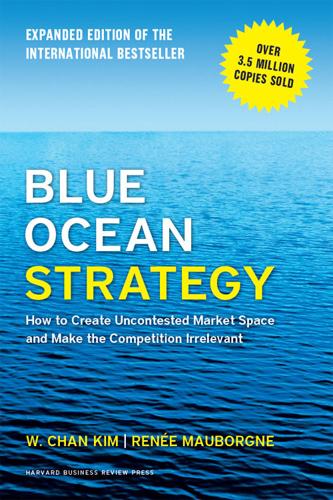
Blue Ocean Strategy, Expanded Edition: How to Create Uncontested Market Space and Make the Competition Irrelevant
by
W. Chan Kim
and
Renée A. Mauborgne
Published 20 Jan 2014
For example, whereas a flight from Washington, DC, to Sacramento would take on average 10.5 hours using commercial airlines, it is only 5.2 hours on a NetJets aircraft; from Palm Springs to Cabo San Lucas takes on average 6 hours commercial, and only 2.1 hours via NetJets. NetJets offers substantial cost savings in total travel time. Perhaps most appealing, your jet is always available with only four hours’ notice. If a jet is not available, NetJets will charter one for you. Last but not least, NetJets dramatically reduces issues related to security threats and offers clients customized in-flight service, such as having your favorite food and beverages ready for you when you board.
…
Often, however, the space between alternative industries provides opportunities for value innovation. Consider NetJets, which created the blue ocean of fractional jet ownership. In less than twenty years since its inception, NetJets grew larger than many airlines, with more than five hundred aircraft, operating more than two hundred fifty thousand flights to more than one hundred forty countries. Today those numbers are even higher, with a fleet of over seven hundred aircraft, flying to over one hundred seventy countries. Purchased by Berkshire Hathaway in 1998, NetJets is a multibillion-dollar business with the largest private jet fleet in the world. NetJets’ success has been attributed to its flexibility, shortened travel time, hassle-free travel experience, increased reliability, and strategic pricing.
…
Comparing first-class travel with private aircraft, the National Business Aviation Association found that when direct and indirect costs—hotel, meals, travel time, expenses—were factored in, the cost of first-class commercial travel was higher.2 As for NetJets, it avoids the fixed costs that commercial airlines attempt to cover by filling larger and larger aircraft. NetJets’ smaller airplanes, the use of smaller regional airports, and limited staff help to keep costs low. To understand the rest of the NetJets formula, consider the flip side: Why do people choose corporate jets over commercial travel? Certainly it is not to pay the multimillion-dollar price to purchase planes.
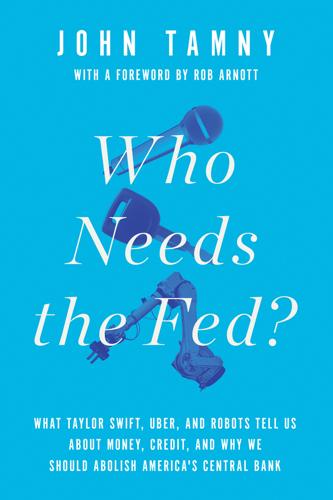
Who Needs the Fed?: What Taylor Swift, Uber, and Robots Tell Us About Money, Credit, and Why We Should Abolish America's Central Bank
by
John Tamny
Published 30 Apr 2016
This raises an obvious question: What happens if there’s a run on a specific NetJets plane? NetJets has more than seven hundred planes in its fleet and keeps adding to that number. If the jet partially owned by a customer is in use, the NetJets rule is they offer their customers another aircraft that is the same or similar to the one the customer partially owns, or, for that matter, a larger one in their fleet that’s not being used. What if there’s a rush on all the planes in the NetJets’ fleet at the same time? If so, just as hotels have overflow deals with other local hotels, so can NetJets access private air transportation outside its fleet for its well-heeled customer base.
…
It’s neither the only owner of high-end aircraft nor the sole fractional-ownership jet company. What needs to be stressed is that despite multiple-person ownership of its planes, NetJets isn’t multiplying them. Even though NetJets has many multiples of seven hundred plane owners with guaranteed access at quick notice to the roughly seven hundred planes it its fleet, NetJets is not playing a trick on its customers. Without presuming to do its complicated math for it, I wager that Net-Jets understands probabilities. While all of its owners have guaranteed access to private flight in a timely manner, the company is well aware that they’re not all going to need to fly at once.
…
Arguably, the best-known provider of private air transportation is Net-Jets. Based in Columbus, Ohio, and owned by Warren Buffett’s Berkshire Hathaway holding company, NetJets sells fractional ownership of the jets in its fleet of seven hundred planes. The benefits to the customer are fairly apparent. Whether they buy fifty hours of flight time per year or four hundred, they have guaranteed access to the plane they’ve purchased a fraction of with little notice required. Obviously, the bigger the fraction they buy, the more annual flight time they have. NetJets oversees the maintenance of each plane, makes sure the pilots are well-trained and licensed, and houses the planes.
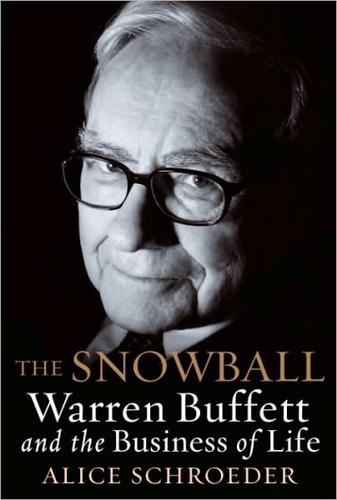
The Snowball: Warren Buffett and the Business of Life
by
Alice Schroeder
Published 1 Sep 2008
At the shareholder meeting, Buffett told investors, “Our idea of tough times is periods like now.”9 With too much cash, too few wonderful ideas, and without calling the Air-a-holic hotline, Buffett now bought a company for Berkshire called NetJets for $725 million.10 He sold the Indefensible and became one of NetJets’ customers. This company sold time-shares in jets of various makes and sizes; its planes all had tail numbers that started with QS, or Quebec Sierra. Susie had gotten Warren to buy her a quarter share in a “fractional” jet from NetJets in 1995, worth two hundred hours a year of flight time, which she referred to as The Richly Deserved.11 She joked that QS stood for Queen Susie. Buffett took to NetJets so much that he had appeared in an ad and endorsed it even before he bought it.
…
If only women could own sports franchises, they’d sell for one-tenth what they sell for now.” He told the shareholders that NetJets would return to profitability and would dominate its market. He did not point out, however, that it might not earn the margin on capital he had hoped, at least not any time soon. It was a letdown, but still a lot better than a money-losing textile mill. Besides, NetJets was fun. He knew mountains of minutiae about how the planes were purchased, managed, scheduled, routed, maintained, insured, piloted, crewed, and even how the pilots were trained. NetJets was cool. He did a lot of elephant-bumping at NetJets events. He would never sell it, even if the world’s other mega-billionaires tried to arm-wrestle him for it.
…
Every board member interviewed reached some variation of this conclusion, no matter where they stood on later events. 8. Mark Pendergast, For God, Country, and Coca-Cola. New York: Charles Scribner’s Sons, 1993. 9. Speaking at the 1998 Berkshire Hathaway shareholder meeting. 10. At the time, NetJets marketed itself both as NetJets and by its legal name, Executive Jet, Inc. It was renamed NetJets in 2002. 11. Interviews with sources; Anthony Bianco, “The Warren Buffett You Don’t Know,” BusinessWeek, July 5, 1999. 12. The business requires a “core fleet” of redundant aircraft, so expensive that running a fractional jet company is by definition unprofitable unless done on a huge scale (or used as a loss-leader by an aircraft manufacturer or other company with a tie-in product). 13.
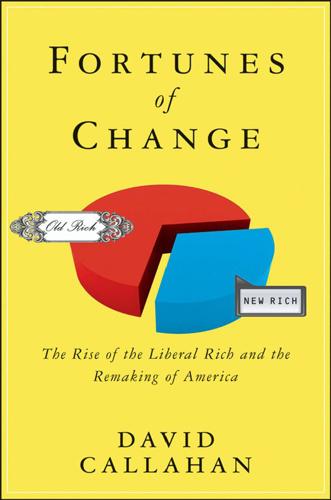
Fortunes of Change: The Rise of the Liberal Rich and the Remaking of America
by
David Callahan
Published 9 Aug 2010
Thus, Booth went on to explain that NetJets Europe was actually hard at work developing a plan to offset its carbon emissions and that the company was committed to doing the “right thing” when it came to climate change. The plan, which was revealed later in September 2007, raised the fees on NetJets’ clients between $4,000 and $5,600 a year to offset the carbon dioxide emissions from their flights. “People want to know we are doing the right thing and every month our customers will be reminded of that in their management fee,” Booth explained.4 Two years later, NetJets announced that it was on track to become carbon neutral by 2012.
…
The Google Guys flew in on their 767 and then sparked nonstop gossip at the conference about who would get to fly back with them to Silicon Valley. (Facebook founder Mark Zuckerberg was among the lucky who were chosen.) NetJets Europe, the continent’s largest private jet operator, booked no fewer than fifty flights to Davos to handle all of the demand for the conference. These flights were a small fraction of the sixty-five thousand private trips the company operated in Europe in 2006—the equivalent to a plane taking off or landing every eight minutes. When the CEO of NetJets Europe, Mark Booth, was criticized for spewing so much carbon into the air around the Davos event, he scoffed at the naïveté of such attacks.
…
“People want to know we are doing the right thing and every month our customers will be reminded of that in their management fee,” Booth explained.4 Two years later, NetJets announced that it was on track to become carbon neutral by 2012. c03.indd 60 5/11/10 6:18:32 AM the eco rich 61 NetJets wasn’t the first jet charter service to make carbon offsets mandatory for all flights. Cerulean Jet, based in Austin, Texas, beat NetJets by a few months in taking this step when it announced that it would buy carbon offsets for all of its flights. Ken Starnes, the CEO of Cerulean Jet, commented that “offsetting our carbon footprint is good for business and good for the environment, ultimately increasing our ability to help in the global warming fight.” Times are certainly changing when private jet companies decide that they need to be on the front lines of the “global warming fight” (or when corporate leaders justify their private jets by saying they want to help Africa).
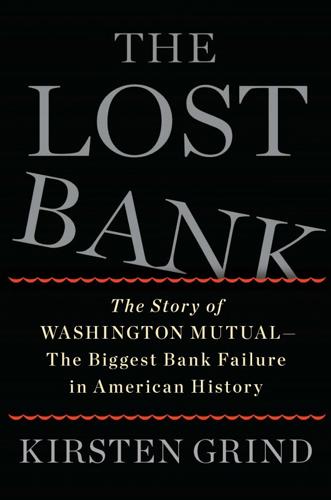
The Lost Bank: The Story of Washington Mutual-The Biggest Bank Failure in American History
by
Kirsten Grind
Published 11 Jun 2012
Every month the bank paid an additional $14,000 for each of the planes, presumably for maintenance. Each time Killinger flew anywhere, it cost about $700 in fuel costs and about $2,500 each hour the plane spent in the air. It wasn’t unusual for Washington Mutual to shell out a couple hundred thousand dollars each month in plane costs. The cost to the company was not detailed for shareholders. NetJets, the timeshare company WaMu used, described one of the planes, a Cessna Citation X, as “the world’s fastest midsized business jet.” It had a 24-foot cabin and large cushy seats, as well as a refreshment center stocked with sandwiches and drinks. This was hardly the picture of corporate excess; many executives at larger investment banks and finance companies traveled on much bigger planes.
…
Chapman drove Tall to the emergency room. The doctors performed a series of tests late into the evening and delivered bad news: Tall needed open heart surgery, right away. But Tall wanted to return to Seattle and his own doctors. Chapman got on the phone and called Killinger. Could the executives use WaMu’s NetJets account to book a private plane back to Seattle? There was no way Tall could travel on a commercial airline in his fragile condition, Craig Chapman explained. Killinger hesitated. “I don’t know if we can get a private plane down there,” he said. After several minutes of discussion, it seemed to Chapman that Killinger either didn’t want them to use the plane or couldn’t decide whether to let them.
…
The private auction had failed, and they had received no word from the regulators about WaMu’s capital-raising plan. As they left, investment bankers in New York continued to camp out at the offices of Simpson Thacher, trying to find other ways to save the company. The WaMu executives debated for a long time whether to fly NetJets, which was already paid for, or commercial, which would look better publicly. In the end, they decided it was more important to return quickly and took the private plane. As they sat on the tarmac, waiting to take off, someone got an e-mail: JPMorgan was planning to hold an investor conference call at 9:00 p.m.
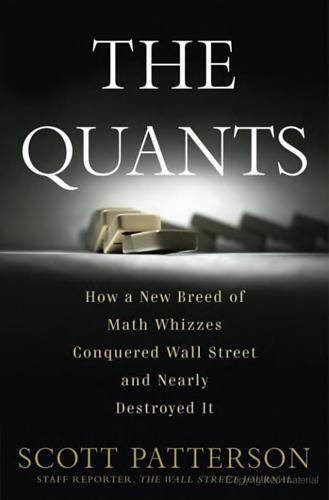
The Quants
by
Scott Patterson
Published 2 Feb 2010
In 2004, he’d become so serious about the game—and so good at it—that he joined the World Poker Tour, pocketing nearly $100,000 in winnings. He played online poker obsessively and even toyed with the bizarre notion of launching an online poker hedge fund. Weinstein, more of a blackjack man, was no slouch at the poker table, having won a Maserati in a 2005 NetJets poker tournament. Griffin simply hated to lose to anyone at anything and approached the poker table with the same brainiac killer instinct that infused his day-to-day trading prowess. No matter how hard they might play elsewhere, no poker game mattered more than when the gamblers around the table were their fellow quants.
…
In 2005, Weinstein’s boss, Anshu Jain, flew to meet with Berkshire Hathaway chairman Warren Buffett in Omaha, Nebraska, to discuss a number of the bank’s high-profile trades, including Weinstein’s. The two moguls were chatting about one of their favorite pastimes, bridge, and the conversation eventually switched to poker. Jain mentioned that Weinstein was Deutsche Bank’s poker ace. Intrigued, Buffett invited Weinstein to an upcoming poker tournament in Las Vegas run by NetJets, the private-jet company owned by Berkshire. Weinstein made his boss proud, winning the tournament’s grand prize: a spanking new Maserati. Still, gambling was just a pastime, a mental curiosity or warm-up for the real deal. Weinstein’s main focus, his obsession, remained trading—winning, crushing his opponents, and making money, huge money.
…
He never lost his cool, even when he was down. He knew it was only a matter of time before he was back on top. The quant poker games lasted late into the night, at times stretching into the following morning. In 2006, Muller took the PDTers on a ski trip to an exclusive ski resort out west, flying the gang on a NetJets private plane. His treat. It would be one of the last few such trips they would make in years. A credit crisis brewing on Wall Street would put an end to such carefree jaunts. But that was a worry for another day. Muller, meanwhile, was getting restless. Playing endless rounds of poker, hiking exotic trails in Hawaii, kayaking in Peru, shooting off on private jets to the Caribbean, dating models—it was all fun, but something was missing: trading, making millions in the blink of an eye, watching the winnings tick up like a rocket.
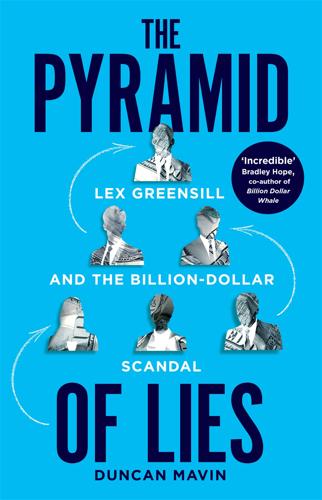
The Pyramid of Lies: Lex Greensill and the Billion-Dollar Scandal
by
Duncan Mavin
Published 20 Jul 2022
Roland and Jessica lived the high life, socializing on board yachts or at fashionable Hamptons parties. The couple were photographed in the society pages of coffee table magazines aimed at New York’s elite. They were so rich, Greensill insiders joked, that even their dogs had accounts with private airplane company NetJets. Roland had never needed the roles at Morgan Stanley or Citi. Greensill was an opportunity to build something more meaningful. Others had long-standing, personal connections to Lex. Chris Bates and Jason Austin were long-time colleagues, and about as close to true friends as anyone Lex knew. They were all in.
…
There were certain markers that Caillaux and the team fixated on. Lex already had a private plane at this point, which raised some eyebrows. It was unusual for a small firm to have its own aircraft. Gabe questioned Lex about it, telling him that it could be bad for his reputation, and that he could instead get a membership with NetJets, or some other aircraft-on-demand service. Lex pushed back: ‘Watch me work for a few months, see how much work I do on board the plane, and then let’s talk about it again.’ After issues with Tim Haywood began to emerge at GAM, GA also talked to some contacts there. Was there a Greensill problem?
…
Morgan ref1 Julius Baer ref1, ref2 Justice, James ‘Jay’, III ref1 Justice, Jim ref1, ref2, ref3, ref4, ref5 Justice, Jim, Jnr ref1 Justice family ref1, ref2, ref3 Katerra ref1 Katz, Adrian ref1 Kelly, Dr David ref1 Kerry Ireland Investments ref1, ref2 Kerry Leeds Investments ref1, ref2, ref3, ref4 Khan, Iqbal ref1, ref2 Khashoggi, Jamal ref1 Kieser, Eberhard ref1 King, Ian ref1, ref2 King & King ref1 Kingfisher ref1 Kleinman, Mark ref1 KPMG ref1, ref2, ref3 Labour government ref1 Laidir ref1 Lanco ref1, ref2 Lane, Jonathan ref1, ref2, ref3, ref4, ref5 Lanng, Christian ref1 Laufer Ltd ref1, ref2, ref3 Left, Andrew ref1 Legal & General ref1 Lewis, Michael ref1 Liberty House Group ref1, ref2, ref3, ref4 Liberty Steel ref1 Liechtenstein ref1 Little Red Boxes (LRBs) (biofuel generators/GenSets) ref1, ref2, ref3 Lloyds ref1, ref2 Long-Term Capital Management ref1 Lotus Formula One team ref1 Lourie ref1 Luckin Coffee ref1 Lutnick, Howard ref1 Macey-Dare, Julian ref1 McGraw Hill ref1 McKinsey & Company ref1, ref2, ref3 McLennan, Marsh ref1 McNamara, Richard ref1 Macquarie ref1 Madoff, Bernie ref1 Major, John ref1 Manchester University ref1, ref2 Marks & Spencer ref1 Massoudi, Arash ref1 Mathys, Luc ref1, ref2, ref3, ref4, ref5 Maude, Francis ref1 Mecca ref1 Mechel ref1, ref2 Medici, Cosimo de’ ref1, ref2 Merrill Lynch ref1, ref2, ref3 Mexico ref1 Microsoft ref1 Middle East ref1 mining ref1, ref2, ref3, ref4 Ministry of Defence ref1 Ministry of Finance (German) ref1 Mir Steel ref1 MIS Motorsport ref1 Misra, Rajeev ref1, ref2, ref3, ref4, ref5, ref6, ref7, ref8 Mizuho ref1, ref2 Mohammed Bin Salman (MBS) ref1 Monteverdi Choir and Orchestra ref1, ref2, ref3 Moody’s ref1 Morgan Stanley ref1, ref2, ref3, ref4, ref5, ref6, ref7, ref8, ref9, ref10, ref11, ref12, ref13, ref14, ref15, ref16, ref17, ref18, ref19, ref20, ref21, ref22, ref23 Trade Receivable electronic Financing System (TReFS) ref1, ref2, ref3 Mubadala Investment Company ref1 Muddy Waters ref1 multi-obligor programmes ref1, ref2 Myners, Paul ref1, ref2 Nacional Financiera (Nafin) ref1 Nagle, Jessica ref1, ref2 National Health Service (NHS) ref1, ref2, ref3, ref4, ref5, ref6 Natixis ref1 NetJets ref1 Network Rail ref1, ref2 Neumann, Adam ref1, ref2, ref3 News Building ref1 Nexia Sydney ref1 NHS see National Health Service NHS Trusts ref1 NMC Health ref1, ref2 NordFinanz Bank AG (NoFi) ref1 Norwegian Air ref1 Obama, Barack ref1, ref2 Obi Mobiles ref1 O’Connor Associates ref1, ref2, ref3 oil, Mexican ref1 Old Lane LLC ref1 Oliver, Craig ref1 Oracle ref1 Orbian ref1 Ortiz, Ricardo ref1 Osborne, George ref1, ref2 OYO Hospitality ref1, ref2 OYO Hotels ref1 OzEcom ref1, ref2, ref3, ref4, ref5, ref6, ref7, ref8, ref9 Pacific Investment Management Company (PIMCO) ref1 Panamera ref1, ref2 Pandit, Vikram ref1 Parduman Group ref1 Patron Systems ref1 payroll processes ref1 Pemex ref1 PEPS see Pharmacy Earlier Payment Scheme Pepsi-Cola Co. ref1 Peter Greensill Family Trust ref1 Pharmacy Earlier Payment Scheme (PEPS) ref1 pharmacy plan ref1 Philips ref1 PIF see Public Investment Fund Pizza Express ref1 Ponzi, Charles ref1 Ponzi schemes ref1 PricewaterhouseCoopers (PwC) ref1, ref2, ref3, ref4, ref5 PrimeRevenue ref1, ref2, ref3, ref4, ref5, ref6, ref7 Primevere ref1 Private Equity News ref1 private jets ref1, ref2, ref3, ref4, ref5, ref6, ref7, ref8 Procter & Gamble ref1 Project Cloud ref1 Project Dill ref1, ref2 Project Olympus ref1 ‘Project Perceval’ ref1 ProPublica ref1 Prudential ref1 Prudential Regulation Authority (PRA) ref1 Prytania Solutions ref1, ref2, ref3 Public ref1 Public Investment Fund (PIF) ref1 Putin, Vladimir ref1 Qunaba, Queensland, Australia ref1 QV Foods ref1 Ramsay, Gordon ref1 Ras, Bart ref1 Rasmussen ref1 Ratamacue ref1 Raza, Wasif ref1 receivables (IOUs) ref1, ref2, ref3, ref4, ref5 prospective/future ref1, ref2, ref3, ref4 registration agents ref1 Rehbein ref1 Reuters News Agency ref1, ref2 reverse factoring ref1, ref2, ref3, ref4, ref5 see also supply chain finance Reynolds, Charles ref1, ref2, ref3 Rigzone ref1 Rio Tinto ref1 Ritz-Carlton hotel, Half Moon Bay ref1 Rohner, Urs ref1 Rolet, Xavier ref1 Rothschild ref1, ref2, ref3 Rothschild, Lord ref1 Roxburgh, Charles ref1 Royal Bank of Scotland ref1 Royal Horseguards Hotel ref1 Ruhan, Andy ref1, ref2, ref3, ref4, ref5, ref6 Russo, Patricia ref1 R.W.
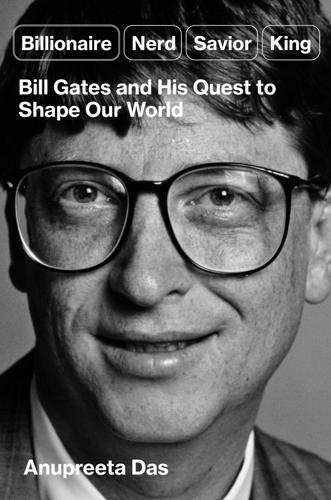
Billionaire, Nerd, Savior, King: Bill Gates and His Quest to Shape Our World
by
Anupreeta Das
Published 12 Aug 2024
The entire family used this annually until Susie Sr.’s [Susan Thompson Buffett, his first wife] death; now used primarily by Susie Jr. [Susan Alice Buffett, his daughter] and friends. Last year I bought a $60,000 pontoon boat from Forest River [a Berkshire company] to be used by the family at Susie’s house at Lake Okoboji. I have a 6.25% interest in a Falcon 2000 operated by NetJets [another Berkshire company], having been a NetJets customer myself and for my family for about 20 years. And that’s about it.”4 Buffett has since sold the Laguna home. By contrast, Gates has a more traditional billionaire’s lifestyle, with multiple homes, planes, expensive art, and a big personal staff to oversee it all.
…
L., 17 Japan, 24 Jassy, Andy, 85 Jay Gatsby (fictional character), 235 Jenner, Edward, 173 Jobs, Eve, 158 Jobs, Laurene Powell, 158, 204, 263 Jobs, Steve, 36, 92–93, 158 see also Apple Johns Hopkins University, 201 Johnson, Boris, 175 Jones, Alex, 246 Joy of Painting, The, 243 JPMorgan Chase, 229–231, 232 Juniper Networks, 33 Just Giving (Reich), 187 Justice Department, see Department of Justice Kalbfleisch, Dorrise, 217–219, 221, 225 Kanter, Jonathan, 86 Kapor, Mitch, 63, 84–85, 156 Kay, Alan, 39 Kennedy, Robert F., Jr., 248 Khan, Lina, 85 Kidder, Tracy, 40 Kiesling, Lydia, 17 King, Gayle, 163–164 Kingdom Holding Company, 213–214 Kirk, Jennifer M., 220–221 Kirkland, Wash., 210 Kirkpatrick, David, 160 Kitsap Sun, 268 KKR (private equity firm), 269 Klawe, Maria, 242–243 Kleiner Perkins, 57 Knight, Phil, 11, 139 Koch brothers, 245, 272 Kraft Heinz, 13 Krawcheck, Sallie, 165 Krueger, Alan B., 264 Kubrick, Stanley, 59 Kumar, Nitish, 200 Kurdziel, Michael, 202 Kurosawa, Akira, 44 Kvas, Kathryn, 249–250 Laguna Beach, Calif., 117 Lakeside School, 51, 66, 261 Lamb, Natasha, 239–241 Land Report, The, 214 Lanai, Hawaii, 154 Lapham, Lewis, 14 Larson, Michael, 208–221 Lasker-Bloomberg Public Service Award, 163 L Brands, 231 Leiweke, Tod, 208 Lemann, Jorge Paulo, 13 Leno, Jay, 65 Lenox Foundation, 120 Leonardo da Vinci Codex, see Codex Leicester Levy, Steven, 97 Ley, Haven, 153 libraries, 98 Lilly Family School of Philanthropy, 21, 29, 170, 202 LinkedIn, 54, 205 Llewellyn, Ann, 210 lobbying, 85 London Summit on Family Planning, 150–151 Loomis, Carol, 120 Loot (TV show), 145 Los Angeles Times, 273 Lotus 1-2-3, 63 Lotus Development Corporation, 63 Lou Gehrig’s disease, 24 Love Don’t Cost a Thing (film), 51 Luke, Gospel of, 167 LVMH (Möet Hennessy Louis Vuitton), 133 Lynas, Mark, 190 Lynch, David, 267 MacAskill, William, 190, 205 Mackey, John, 266 Macmillan (publisher), 166 Made in America (Walton), 17 Magna Carta, 26 “Magnificent Seven,” 44 Mahajan, Manjari, 199 “Making Microsoft Safe for Capitalism” (Gleick), 63 malaria research, 89–90, 276–277 “maleness,” 56–57 Malik, Om, 84 Malone, John, 214 March of Dimes, 24 marriage, 158–159 Masiyiwa, Strive, 193 Massachusetts, 258 Massachusetts Institute of Technology, see MIT Masters, Blake, 272 Mayer, Oscar, 261 McAllister, Ward, 16 McCarthy, Joseph, 245 McCollim, Elena M., 136 McDonald’s, 200, 215 McGoey, Linsey, 185 McNamee, Roger, 213 McNealy, Scott, 41 McVeigh, Timothy, 245 Medina, Wash., 156 Medtronic, 220 mega-donors, 28–29 Menlo Park, Calif., 72 Merkel, Angela, 175 Meta, 10, 18, 44, 84, 85 #MeToo movement, 240 Metropolitan Correctional Center, 231 Metropolitan Museum of Art, 28 Miami Herald, 231 Microsoft and antitrust, 71, 73–74, 79 board of directors, 161 culture of, 25, 68, 78, 111 early years of, 31–37, 41–42, 44 FTC consent decree, 71, 73–74 lawsuit, 238–239 lobbying of, 85 market dominance of, 64–65, 76–79, 81 partnership with Apple, 93 and public relations, 81–82 sexual harassment at, 238–243 stock, 42 see also specific products, e.g., Windows Microsoft Azure, 84, 87 Miller, Bill, 215 Miller, Lauren, 107 Milken, Michael, 40 Minecraft (game), 51 Mister Rogers, see Rogers, Fred MIT (Massachusetts Institute of Technology), 39, 69, 232–233, 247 MIT Media Lab, 222, 232 MITS-Altair, 34 mobile phones, see iPhones Modi, Narendra, 194–195, 198–200 Möet Hennessy Louis Vuitton (LVMH), 133 Mohanan, Manoj, 184–185, 200 Moment of Lift, The (French Gates), 143, 155 Moment of Lift books, 166 Money, 72 Moniz, Amanda B., 22 Monsanto, 119 Morgan, John Pierpont, 20 Morning Consult, 258 Mosaic, 42 Moskovitz, Dustin, 206 Motsepe, Patrice, 223 Mount Sinai Hospital (New York), 158 Moussouris, Katie, 238–239 Movie Maker, 69 MS-DOS, 35 Muglia, Bob, 33, 78, 80 Muise, Doug, 52 Murdoch, Rupert, 10 Musk, Elon, 45, 53–56, 58, 269 Myhrvold, Nathan, 75, 222–223, 228 myths, around start-up founders, 47–49 Nadella, Satya, 86–87, 195, 242–243 NaMo app, 198 Nassar, Nayel, 158 National Archives, 26 National Center for Supercomputing Applications, 42 National Committee for Responsive Philanthropy, 138 National Institute of Allergy and Infectious Diseases (NIAID), 175, 248 National Institutes of Health (NIH), 177, 182 National Medal of Technology, 70 National Museum of American History, 22 National Nutrition Mission, 198 National Philanthropic Trust, 27 National Register of Historic Places, 47 Neilson, Trevor, 99, 179, 202–203 Nelson, Willie, 154 Nerdle, 107 nerds, 37–38, 50–54 Netflix, 44, 103, 187, 256 NetJets, 117 Netscape, 43, 64, 74 Netscape Navigator, 76–77 New England Journal of Medicine, The, 247 New School for Social Research, 199 Newsweek, 97 Newtown, Conn., 246 New York City, 21 New Yorker, The, 84, 190, 232–233, 250 New York magazine, 237 New York Mets, 273 New York Public Library, 26, 119–120, 122–123 New York State, 258 New York Times, The, 16, 43, 50, 190, 219, 237, 259 New York Times Magazine, The, 17, 63 New York University, 187, 244 New York World, The, 24 New York World’s Fair, 10 NeXT, 92 “Next Bill Gates Won’t Look Like the Last One, The” (French Gates), 171 “Next Outbreak?
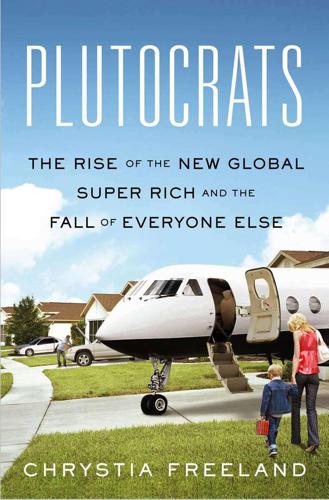
Plutocrats: The Rise of the New Global Super-Rich and the Fall of Everyone Else
by
Chrystia Freeland
Published 11 Oct 2012
“A lot of people under forty years old are making, like, $20 million or $30 million a year in these hedge funds, and they don’t know what to do with it.” As an example, she described a conversation at a dinner party: “They started saying, if you’re going to buy all this stuff, life starts getting really expensive. If you’re going to do the NetJets thing”—this is a service offering “fractional aircraft ownership” for those who do not wish to buy outright—“and if you’re going to have four houses, and you’re going to run the four houses, it’s like you start spending some money.” The clincher, Peterson said, came from one of her dinner companions.
…
A California technology executive—himself a global nomad who has lived and worked in Europe and Asia—explained to me that a company like Bharti has a competitive advantage in what he believes will be the exploding African market: “They know how to provide mobile phones so much more cheaply than we do. In a place like Africa, how can Western firms compete?” ARISTOCRACY OF IDEAS Just as the railroad created new cities, private jets and private jet time-shares like NetJets have contributed to the globalization of the super-elite—owning homes and doing deals around the world becomes feasible when you can travel the planet as easily as the middle class steps into a car. New technologies have helped, too—instant and mobile communication makes it possible to live on the move and around the world.
…
P., 6, 119 Morgan Stanley, 63, 122 Moritz, Michael, 234 mortgage market, 146, 166–67, 169–70, 217 Mossler, Fred, 233 motion picture industry, 98, 100, 109, 127–30 Mount, Harry, 57, 67 Moyo, Dambisa, 266 Mubarak, Hosni, 144 Mullainathan, Sendhil, 138–40 Müller-Ötvös, Torsten, 46 Murphy, Kevin J., 131–34, 137 Murray, Charles, 286 music industry, 109–10, 126–27, 170–71 n-11 economies, 30 Nakamoto, Michiyo, 169 Naspers, 66 Neeleman, David, 156–57 Netherlands, 16 NetJets, 2, 66 New Class, 264–69 New Class, The (Djilas), 89–90 New Deal, 13–14, 132–34, 177 Newsweek, 127 New Yorker, 33 New York Times, 6, 7, 39, 45, 70, 125, 126, 140, 165, 174, 227, 258, 268 New York World, 7 New Zealand, 3, 159–60 Next Convergence, The: The Future of Economic Growth in a Multispeed World (Spence), 20 Nicaragua, 191 Niccolini, Julian, 36 Nigeria, 66 Nobel, Alfred, 71 Nobel Prize, 50, 69, 123, 124, 126, 175 Nolte, Nick, 127 Nucor, 158 Oakland A’s, 129 Obama, Barack, x, 18, 92–93, 242–43, 245, 247, 249, 250, 258, 269 as empiricist, 93 Observer, 74 Occupy movement, 28, 42, 80, 83, 92, 238, 244–45, 248–51 O’Connor, Caroline, 171–72 Odnoklassniki, 163 OECD, 3 O’Neill, Jim, 19, 21, 29–30, 33 one percent, xii, 135 0.1 percent vs., 79–83 99 percent vs., 80 during 1940s–1970s period, 14 in economic recovery of 2009–2010, xiii political vs. economic focus on, xiv share of national income, 3, 14 Open Society Foundations, 70, 77 Orange Revolution, 79–80, 192 Orlov, Yuri, 90 Orszag, Peter, 18 Orwell, George, 90 outsourcing, 92, 105, 106, 155, 179, 241 Oxford University, 62 Page, Larry, 55 PaineWebber, 142 Palin, Sarah, 83, 223 Pangea3, 106–7 paradigm shifts, 144, 145, 164 see also revolutions paradox of happy peasants and miserable millionaires, 31–32, 51, 82 Paulson, Hank, 213, 271–72 Paulson, John, 148, 244 Pavarotti, Luciano, 97, 98 pay for performance, 136, 138, 139 PayPal, 171, 183 Perella, Joe, 170 Peru, 82 Peterson, Holly, 1–3, 52, 80–81 Peterson, Pete, 1, 36–37, 44–45, 70, 78, 80 Petrarca, Francesco, 278 philanthro-capitalism, 71, 74–76, 264, 267 philanthropy, 70–76, 246, 264 Philippines, 25 Philippon, Thomas, 48, 53, 220–21 Pierson, Paul, 18 Piff, Paul, 239 Piketty, Thomas, 34, 43 Pimco, 65, 251 Pinchuk, Victor, 72–73, 268, 270 Pipes, Richard, 145 Pisarev, Kirill, 103 pivoting, 171–73 Platinum Study, 43 Pleading Guilty (Turow), 38 Plepler, Richard, 72 Pliny the Elder, 195 Plutarch, 195 political influence, 222–24, 247, 260–62 political revolutions, 144–46 politicians, 76–79, 269–70 Polo, Marco, 278 Poore, Peter, 76 PopTech, 67 Porter, Michael, 23 Posner, Victor, 120, 122 Potanin, Vladimir, 151 Premji, Azim, 155 Prince, Chuck, 169–70 private equity, 120–22, 128, 190, 243, 280 privatization, 193–94, 205, 207, 222, 225 in Russia, 162–64, 176, 179–81, 188, 192–93, 198, 207, 218, 223, 225 telecom, 196–98 privilege, 239 transferred to children, 282–83 Progress and Poverty (George), 38, 40–41 Progressive Era, 39, 78 Prokhorov, Mikhail, 162 Putin, Vladimir, 80, 107, 149–51, 255 Qiu Ying, 96 Quantum Fund, 142, 143, 154, 172 Queen Elisabeth Competition, 126 Quiggin, John, 48 Radia, Niira, 200 railroads, 178, 191 Raja, Andimuthu, 200 Rajan, Raghuram, 188–89, 198, 201, 228 Rajaratnam, Raj, 121–22 Rakoff, Jed, 256 Rand, Ayn, 249 Rauh, Joshua, 119–20 Ravid, Abraham, 130 Reagan, Ronald, 17, 89 Reagan Revolution, xii real estate, 222–23 Red Capitalism (Walter and Howie), 207–8 Reformed Broker, The, 84 Reich, Robert, 3 Renaissance, 96 Renaissance Capital, 65, 159 rentier elite, 42, 43, 283 rent-seeking, 188–228, 283 in China, 204–10 globalization and, 226–28 in India, 198–200, 228 value creation vs., 280–81 Reshef, Ariell, 48, 220–21 revolutions, 141–87 industrial, see industrial revolution political, 144–46 in technology, xiv, 4, 14–15, 18, 19, 21, 22, 25, 28, 30–31, 67, 100, 104, 146, 157–58, 164, 166, 184, 221, 285 Reynolds, Joshua, 94 “rich,” use of word, x Roach, Stephen, 210 robber barons, xv, 9, 19, 41, 42, 71, 118, 134, 191, 195, 237 Roosevelt on, 177–78 Robertson, Julian, 142 Robinson, James, 279–80 Rockefeller, John D., 195 Rodriguez, Alex, 108–9 Rolls-Royce, 46 Romney, Mitt, 77, 92–94, 236, 237, 286 as empiricist, 93–94 Roosevelt, Franklin Delano, 132 Commonwealth Club speech of, 176–78 New Deal of, 13–14, 132–34, 177 Roosevelt, Theodore, 39 Rose, Charlie, 72 Rosen, Sherwin, 97, 99–100, 107–12, 116, 123 Rosoff, Matt, 238 Royal Bank of Canada, 217 Royal Bank of Scotland, 217 Rubenstein, David, 121, 148–49 Rubin, Bob, 213 Russia, 3, 14, 19, 35, 56, 62, 66, 82, 96, 148, 149, 159–61, 163, 164, 178–81, 186, 206, 260 billionaire-to-GDP ratio in, 189 Bolsheviks in, 14, 93, 145, 284 privatization in, 162–64, 176, 179–81, 188, 192–93, 198, 207, 218, 223, 225 Revolution in, 152–53 science and technology in, 178–79 Russian oligarchs, 42, 46, 51–52, 61–62, 72, 92, 107, 147, 149–52, 186, 193, 196, 223, 255, 285 Ryan, Paul, 83, 190 Sabharwal, Manish, 32 Saez, Emmanuel, xiii, 34, 35–36, 43, 117, 281 Saïd, Wafic, 62 Sainath, Palagummi, 32 Saint Laurent, Yves, 114–16 Salganik, Matthew, 126 Salinas, Carlos, 196, 198 Salomon Brothers, 130 Sandberg, Sheryl, 174–75 Santorum, Rick, 246 Sawiris, Naguib, 4, 35, 77 Say’s law, 30–31 Schiff, Peter, 245 Schmidt, Eric, 56, 58, 69, 104–5, 236, 238, 280–81 Schmidt, Jacqueline, 70 Schrage, Elliot, 47 Schultz, Howard, 69 Schumer, Chuck, 211–13, 227 Schumpeter, Joseph, 32, 118 Schwarzman, Steve, 1, 36–37, 45, 46, 60, 147, 237, 243 science, 123–25 screenplays, 128 Seasteading Institute, 250 Securities and Exchange Commission (SEC), 226, 256 self-interest, 178, 215, 216, 239–40, 243–44, 249, 273–75, 286 Sennett, Mack, 98 Sense and Sensibility (Austen), 274–75 sewing machine, 113–15 Shaw, George Bernard, 39 Shelley, Percy Bysshe, 89 Shubrick, 40 Silicon Valley, 46–47, 56, 93, 163–64, 166, 171, 174, 175, 181–83, 230–31, 235, 236, 238, 283, 285 Silver Lake, 59 Simmons, Ruth, 284 Singapore, 63 Singer, Paul, 77 Singh, Manmohan, 155, 198–99 Sinha, Jayant, 189 skill-biased technical change, 91 skimming, 138 Slim, Carlos, 42, 46, 51, 195–98, 199, 218, 227, 236, 255 Smith, Adam, 67, 131, 138, 194, 229 Smith, Art, 112 Smith, Michael, 102 social mobility, 5, 82, 278–79 income inequality and, 283–84 Socialnet, 183 Somoza family, 191 Sorensen, Alan, 126 Soros, George, 53–54, 70, 73, 77, 141–45, 147, 148, 152–55, 172–73, 242 Soros, Jonathan, 153, 173 Soros, Tivadar, 152–53 South Korea, 32, 193 Soviet republics, former, 20, 77, 149, 155, 192, 193, 267 Soviet Union, 14, 17, 89–90, 144, 155, 178–80, 266 Spectator, 56–57, 59, 67 Spence, Michael, 20, 187 Spitzer, Eliot, 213 Splinter, Michael, 64 sports stars, 108–9, 129, 130, 138 Stalin, Joseph, 20, 90 Stanford Business School, 61, 147 Starr International, 101 Start-Up of You, The (Hoffman), 184–85, 187 Stengel, Rick, 72 Stephenson, Randall, 164, 185–86 Stevenson, Betsey, 32 Stewart, Rod, 36 Stiglitz, Joe, 27 Stock Market Boys, 51 Stoll, Craig, 112–13 Strauss-Kahn, Dominique, 72, 238–39 Stringer, Howard, 36 student activism, 268 Sull, Donald, 145, 147, 167–68, 171 Summers, Larry, xiii, 49, 87, 165, 174 Sunstein, Cass, 93 Sun Valley, 68 Sun Yat-sen, 39 superstars, 88–140 fees charged by, 101–3 globalization and, 91–92, 108 income of, vs. everyone else, 100–101 industrial revolution and, 95–99, 118 and talent vs. capital, 116–17, 122, 129–30 technology and, 91–92, 98–100, 108, 109 “Sustaining New York’s and the US’ Global Financial Services Leadership,” 211–15 Swank, Hilary, 110 Sweden, xii, 3, 12 Switzerland, 35, 63 Szelényi, Ivan, 89–90, 136, 266 Tahrir Square, 80 Taiwan, 35 Tawney, R.
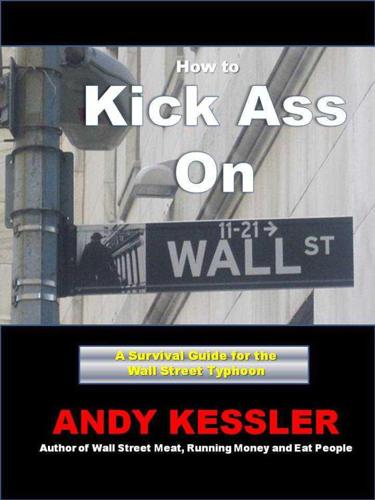
How to Kick Ass on Wall Street
by
Andy Kessler
Published 4 Jun 2012
In good times, you’ll be paid in cash. I don’t know if anyone actually hands out checks anymore, but try to get a check, something tangible for all that work. Then immediately cash it (in case they change their mind) and keep it in the bank. Buy a nice dinner. Don’t buy a Porsche or a place in the Hamptons or a NetJets card. Not yet. Build up the notorious FU money. At least a year or two of living expenses in case you want to leave or have to leave. What you may not realize is that in bad times, you still are going to be paid some bonus, though much lower than you’d like. But that bonus is often paid with little pieces of paper with your CEO’s picture on it.

Private Equity: A Memoir
by
Carrie Sun
Published 13 Feb 2024
The outbound flight was set for circa seven thirty a.m. out of Teterboro, New Jersey, the closest FBO to Midtown. When Boone and Matt were supposed to be wheels up and eating a breakfast of fruit and eggs and toast, I got a call. “Where’s Matt?” Boone asked. The soft belly of my stomach turned into stone. “Let me find out and call you back.” NetJets is an on-demand private jet company, so details like specific aircraft and FBO can change at the eleventh hour. An airport can have multiple FBOs. Teterboro had five, one of which, Signature Flight Support, had two terminals: East and West. I had updated the calendar invite within the last day or so with new information, a change of meeting location from one Signature FBO to the other so that Matt and his assistant, Sloane, would know precisely where Matt’s driver should drop him off.
…
During a recent sit, Boone, sensing a question I had not verbalized, said, “Sloane came to me earlier and resigned.” * * * — WITH ONE DAY TO GO, Val whispered to me in the kitchen, “I think Boone is grumpy because he thinks we forgot his birthday!” * * * — ON THE MORNING of the surprise, Boone was in Montreal. He had had enough of NetJets. “Can’t someone pick it up for me?” he’d asked. No, I said, I already called Bombardier and they told me you should go pick it up yourself. “Do I have to do the delivery ceremony?” No, I said, but I think it would be a nice gesture and take ten minutes—tops—for you to shake hands with and thank, in person, the mechanics and engineers who literally built your plane

Brazillionaires: The Godfathers of Modern Brazil
by
Alex Cuadros
Published 1 Jun 2016
Gradually, little red dots appeared stickered below artworks that had sold. To call your VIP lounge by its name would be crass, so the fair had a Collectors’ Lounge. Crates of Miami Basel’s official champagne were arrayed in a kind of rainbow shape at one side. The champagne brand, Ruinart, was not a conceptual artist’s joke. Past the bar I could see a booth for NetJets, the private-plane time-share company. Toward the back of the lounge was another, smaller lounge administered by UBS, the Swiss bank. You could only enter with some higher-level credential I hadn’t heard of. The fair was organized like Russian nesting dolls of exclusivity. I stopped by my friend’s gallery space for a chat.
…
Pierpont, 131 Moro, Sergio, 273–74, 316n274 MPX Energia, 144, 147, 170, 186, 222, 246, 247 bankruptcy of, 252 Murdoch, Rupert, 93, 298n93 Musk, Elon, 277 Não Somos Racistas (Kamel), 100, 207 Naouri, Jean-Charles, 4 Nasaw, David, 205–6 Natal, Brazil, 313n237 National Foundation of the Indian (Funai), 69, 74 National Oil Agency (ANP), 248 Natura Cosméticos, 213 Nestlé, 291n42 NetJets, 28 Neves, Aécio, noteTK Neves, Tancredo, 89–90 Newcomb, Peter, 29 New York Times Maggi interview, 62, 64 Niemeyer, Oscar, 63 Nissan car company, 190 Niué island, 24 Norte Energia, 71, 73, 74, 75 NRX-Newrest, 155 OAS, 239 bankruptcy of, 273 Belo Monte dam and, 239 Carwash and, 270–71 Natal soccer stadium, 313n237 political donations and favors, 239–40, 285TK, 313n239 Roberto Marinho Ave. costs and, 34, 239 Obama, Barack, 16 Oban (Operação Bandeirante), 40–41, 42–43, 44, 87, 290n40 companies supporting, 40, 42, 291n41, 291n42 Occupy Wall Street, 17, 236 o clube da propina (bribe club), 273, 274 Odebrecht, 30, 32, 36, 44, 45, 55, 289n36, 291–92n44 aligned with Brazil’s interests, 56–57 Arena Corinthians and, 258 Belo Monte dam and, 67, 71, 72, 77 campaign donations and, 275, 284 Carwash and cartel for Petrobras contracts, 51, 270–71 Lula and, 57, 274, 285TK, 293–94n57, 316–17n274 Maracanã stadium and, 226, 227, 238 Olympic Games construction, 274 Olympic Village construction, 283–84 Odebrecht, Emílio, 51, 275 Odebrecht, Marcelo, 58, 76, 202, 273–74, 275, 293–94n57 plea-bargain, noteTK prison sentence, 285TK Odebrecht, Norberto, 291–92n44 OGX Petróleo, 135–36, 144, 145–46, 147, 150, 151–52, 156, 247, 248, 262–64, 303n136, 304n146 auction of assets, 252 auditing of, 152, 245 bankruptcy of, 247, 314n247 bonds sold, 181–82 Carneiro as CEO, 249 cessation of production, 242 CVM investigation and, 248–49, 276, 314n248 efforts to bail out, 220, 222, 223, 240–41 Eike promises to inject cash, 190–91, 241, 249, 308n190 Eike sells stock in, 241 executive luxuries, 215 impact on Eike’s empire, 187, 188 investor losses, 245, 261 investors, 182, 193, 224–25 losses of, 185–88, 189, 215, 224–25 Mendonça as CEO, 216–17 Schlumberger report, 261 stock price and, 186, 241–42 oil production, xv, 15–16, 30, 135–36, 145.
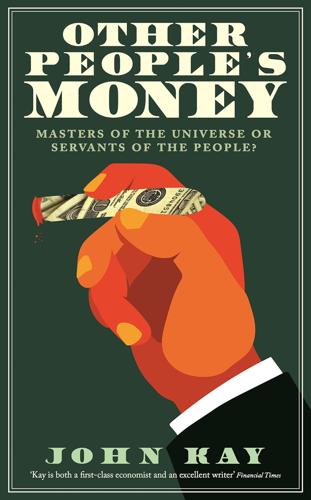
Other People's Money: Masters of the Universe or Servants of the People?
by
John Kay
Published 2 Sep 2015
Warren Buffett is the most successful investor in history, having parlayed modest beginnings into a fortune that has made him one of the richest men in the world. Berkshire Hathaway is now one of the largest US companies. Berkshire Hathaway owns the world’s largest re-insurance company, GEICO, businesses as diverse as Netjets (which charters executive jets), Equitas (the insurance company created to handle the fall-out from the Lloyd’s débâcle) and See’s Candies. Berkshire also holds substantial stakes in major quoted companies, such as Coca-Cola and Procter & Gamble. Buffett is distinguished by the extreme simplicity of his methods, his disdain for the conventional wisdom of the finance industry and his refusal to invest in anything he finds difficult to understand.
…
.: Hyperion 220 Loomis, Carol 108 lotteries 65, 66, 68, 72 Lucas, Robert 40 Lynch, Dennios 108 Lynch, Peter 108, 109 M M-Pesa 186 Maastricht Treaty (1993) 243, 250 McCardie, Sir Henry 83, 84, 282, 284 McGowan, Harry 45 Machiavelli, Niccolò 224 McKinley, William 44 McKinsey 115, 126 Macy’s department store 46 Madoff, Bernard 29, 118, 131, 132, 177, 232, 293 Madoff Securities 177 Magnus, King of Sweden 196 Manhattan Island, New York: and Native American sellers 59, 63 Manne, Henry 46 manufacturing companies, rise of 45 Marconi 48 marine insurance 62, 63 mark-to-market accounting 126, 128–9, 320n22 mark-to-model approach 128–9, 320n21 Market Abuse Directive (MAD) 226 market economy 4, 281, 302, 308 ‘market for corporate control, the’ 46 market risk 97, 98, 177, 192 market-makers 25, 28, 30, 31 market-making 49, 109, 118, 136 Markets in Financial Instruments Directive (MIFID) 226 Markkula, Mike 162, 166, 167 Markopolos, Harry 232 Markowitz, Harry 69 Markowitz model of portfolio allocation 68–9 Martin, Felix 323n5 martingale 130, 131, 136, 139, 190 Marx, Groucho 252 Marx, Karl 144, 145 Capital 143 Mary Poppins (film) 11, 12 MasterCard 186 Masters, Brooke 120 maturity transformation 88, 92 Maxwell, Robert 197, 201 Mayan civilisation 277 Meade, James 263 Means, Gardiner 51 Meeker, Mary 40, 167 Melamed, Leo 19 Mercedes 170 merchant banks 25, 30, 33 Meriwether, John 110, 134 Merkel, Angela 231 Merrill Lynch 135, 199, 293, 300 Merton, Robert 110 Metronet 159 Meyer, André 205 MGM 33 Microsoft 29, 167 middleman, role of the 80–87 agency and trading 82–3 analysts 86 bad intermediaries 81–2 from agency to trading 84–5 identifying goods and services required 80, 81 logistics 80, 81 services from financial intermediaries 80–81 supply chain 80, 81 transparency 84 ‘wisdom of crowds’ 86–7 Midland Bank 24 Milken, Michael 46, 292 ‘millennium bug’ 40 Miller, Bill 108, 109 Minuit, Peter 59, 63 Mises, Ludwig von 225 Mittelstand (medium-size business sector) 52, 168, 169, 170, 171, 172 mobile banking apps 181 mobile phone payment transfers 186–7 Modigliani-Miller theorem 318n9 monetarism 241 monetary economics 5 monetary policy 241, 243, 245, 246 money creation 88 money market fund 120–21 Moneyball phenomenon 165 monopolies 45 Monte Carlo casino 123 Monte dei Paschi Bank of Siena 24 Montgomery Securities 167 Moody’s rating agency 21, 248, 249, 313n6 moral hazard 74, 75, 76, 92, 95, 256, 258 Morgan, J.P. 44, 166, 291 Morgan Stanley 25, 40, 130, 135, 167, 268 Morgenthau, District Attorney Robert 232–3 mortality tables 256 mortgage banks 27 mortgage market fluctuation in mortgage costs 148 mechanised assessment 84–5 mortgage-backed securities 20, 21, 40, 85, 90, 100, 128, 130, 150, 151, 152, 168, 176–7, 284 synthetic 152 Mozilo, Angelo 150, 152, 154, 293 MSCI World Bank Index 135 muckraking 44, 54–5, 79 ‘mugus’ 118, 260 multinational companies, and diversification 96–7 Munger, Charlie 127 Munich, Germany 62 Munich Re 62 Musk, Elon 168 mutual funds 27, 108, 202, 206 mutual societies 30 mutualisation 79 mutuality 124, 213 ‘My Way’ (song) 72 N Napoleon Bonaparte 26 Napster 185 NASA 276 NASDAQ 29, 108, 161 National Economic Council (US) 5, 58 National Employment Savings Trust (NEST) 255 National Institutes of Health 167 National Insurance Fund (UK) 254 National Provincial Bank 24 National Science Foundation 167 National Westminster Bank 24, 34 Nationwide 151 Native Americans 59, 63 Nazis 219, 221 neo-liberal economic policies 39, 301 Netjets 107 Netscape 40 Neue Markt 170 New Deal 225 ‘new economy’ bubble (1999) 23, 34, 40, 42, 98, 132, 167, 199, 232, 280 new issue market 112–13 New Orleans, Louisiana: Hurricane Katrina disaster (2005) 79 New Testament 76 New York Stock Exchange 26–7, 28, 29, 31, 49, 292 New York Times 283 News of the World 292, 295 Newton, Isaac 35, 132, 313n18 Niederhoffer, Victor 109 NINJAs (no income, no job, no assets) 222 Nixon, Richard 36 ‘no arbitrage’ condition 69 non-price competition 112, 219 Norman, Montagu 253 Northern Rock 89, 90–91, 92, 150, 152 Norwegian sovereign wealth fund 161, 253 Nostradamus 274 O Obama, Barack 5, 58, 77, 194, 271, 301 ‘Obamacare’ 77 Occidental Petroleum 63 Occupy movement 52, 54, 312n2 ‘Occupy Wall Street’ slogan 305 off-balance-sheet financing 153, 158, 160, 210, 250 Office of Thrift Supervision 152–3 oil shock (1973–4) 14, 36–7, 89 Old Testament 75–6 oligarchy 269, 302–3, 305 oligopoly 118, 188 Olney, Richard 233, 237, 270 open market operations 244 options 19, 22 Organisation for Economic Co-operation and Development (OECD) 263 Osborne, George 328n19 ‘out of the money option’ 102, 103 Overend, Gurney & Co. 31 overseas assets and liabilities 179–80, 179 owner-managed businesses 30 ox parable xi-xii Oxford University 12 P Pacific Gas and Electric 246 Pan Am 238 Paris financial centre 26 Parliamentary Commission on Banking Standards 295 partnerships 30, 49, 50, 234 limited liability 313n14 Partnoy, Frank 268 passive funds 99, 212 passive management 207, 209, 212 Patek Philippe 195, 196 Paulson, Hank 300 Paulson, John 64, 109, 115, 152, 191, 284 ‘payment in kind’ securities 131 payment protection policies 198 payments system 6, 7, 25, 180, 181–8, 247, 259–60, 281, 297, 306 PayPal 167, 168, 187 Pecora, Ferdinand 25 Pecora hearings (1932–34) 218 peer-to-peer lending 81 pension funds 29, 98, 175, 177, 197, 199, 200, 201, 208, 213, 254, 282, 284 pension provision 78, 253–6 pension rights 53, 178 Perkins, Charles 233 perpetual inventory method 321n4 Perrow, Charles 278, 279 personal financial management 6, 7 personal liability 296 ‘petrodollars’ 14, 37 Pfizer 96 Pierpoint Morgan, J. 165 Piper Alpha oil rig disaster (1987) 63 Ponzi, Charles 131, 132 Ponzi schemes 131, 132, 136, 201 pooled investment funds 197 portfolio insurance 38 Potts, Robin, QC 61, 63, 72, 119, 193 PPI, mis-selling of 296 Prebble, Lucy: ENRON 126 price competition 112, 219 price discovery 226 price mechanism 92 Prince, Chuck 34 private equity 27, 98, 166, 210 managers 210, 289 private insurance 76, 77 private sector 78 privatisation 39, 78, 157, 158, 258, 307 probabilistic thinking 67, 71, 79 Procter & Gamble 69, 108 product innovation 13 property and infrastructure 154–60 protectionism 13 Prudential 200 public companies, conversion to 18, 31–2, 49 public debt 252 public sector 78 Q Quandt, Herbert 170 Quandt Foundation 170 quantitative easing 245, 251 quantitative style 110–11 quants 22, 107, 110 Quattrone, Frank 167, 292–3 queuing 92 Quinn, Sean 156 R railroad regulation 237 railway mania (1840s) 35 Raines, Franklin 152 Rajan, Raghuram 56, 58, 79, 102 Rakoff, Judge Jed 233, 294, 295 Ramsey, Frank 67, 68 Rand, Ayn 79, 240 ‘random walk’ 69 Ranieri, Lew 20, 22, 106–7, 134, 152 rating agencies 21, 41, 84–5, 97, 151, 152, 153, 159, 249–50 rationality 66–7, 68 RBS see Royal Bank of Scotland re-insurance 62–3 Reagan, Ronald 18, 23, 54, 59, 240 real economy 7, 18, 57, 143, 172, 190, 213, 226, 239, 271, 280, 288, 292, 298 redundancy 73, 279 Reed, John 33–4, 48, 49, 50, 51, 242, 293, 314n40 reform 270–96 other people’s money 282–5 personal responsibility 292–6 principles of 270–75 the reform of structure 285–92 robust systems and complex structures 276–81 regulation 215, 217–39 the Basel agreements 220–25 and competition 113 the origins of financial regulation 217–19 ‘principle-based’ 224 the regulation industry 229–33 ‘rule-based’ 224 securities regulation 225–9 what went wrong 233–9 ‘Regulation Q’ (US) 13, 14, 20, 28, 120, 121 regulatory agencies 229, 230, 231, 235, 238, 274, 295, 305 regulatory arbitrage 119–24, 164, 223, 250 regulatory capture 237, 248, 262 Reich, Robert 265, 266 Reinhart, C.M. 251 relationship breakdown 74, 79 Rembrandts, genuine/fake 103, 127 Renaissance Technologies 110, 111, 191 ‘repo 105’ arbitrage 122 repo agreement 121–2 repo market 121 Reserve Bank of India 58 Reserve Primary Fund 121 Resolution Trust Corporation 150 retirement pension 78 return on equity (RoE) 136–7, 191 Revelstoke, first Lord 31 risk 6, 7, 55, 56–79 adverse selection and moral hazard 72–9 analysis by ‘ketchup economists’ 64 chasing the dream 65–72 Geithner on 57–8 investment 256 Jackson Hole symposium 56–7 Kohn on 56 laying bets on the interpretation of incomplete information 61 and Lloyd’s 62–3 the LMX spiral 62–3, 64 longevity 256 market 97, 98 mitigation 297 randomness 76 socialisation of individual risks 61 specific 97–8 risk management 67–8, 72, 79, 137, 191, 229, 233, 234, 256 risk premium 208 risk thermostat 74–5 risk weighting 222, 224 risk-pooling 258 RJR Nabisco 46, 204 ‘robber barons’ 44, 45, 51–2 Robertson, Julian 98, 109, 132 Robertson Stephens 167 Rockefeller, John D. 44, 52, 196 Rocket Internet 170 Rogers, Richard 62 Rogoff, K.S. 251 rogue traders 130, 300 Rohatyn, Felix 205 Rolls-Royce 90 Roman empire 277, 278 Rome, Treaty of (1964) 170 Rooney, Wayne 268 Roosevelt, Franklin D. v, 25, 235 Roosevelt, Theodore 43–4, 235, 323n1 Rothschild family 217 Royal Bank of Scotland 11, 12, 14, 24, 26, 34, 78, 91, 103, 124, 129, 135, 138, 139, 211, 231, 293 Rubin, Robert 57 In an Uncertain World 67 Ruskin, John 60, 63 Unto this Last 56 Russia defaults on debts 39 oligarchies 303 Russian Revolution (1917) 3 S Saes 168 St Paul’s Churchyard, City of London 305 Salomon Bros. 20, 22, 27, 34, 110, 133–4 ‘Salomon North’ 110 Salz Review: An Independent Review of Barclays’ Business Practices 217 Samuelson, Paul 208 Samwer, Oliver 170 Sarkozy, Nicolas 248, 249 Savage, L.J. 67 Scholes, Myron 19, 69, 110 Schrödinger’s cat 129 Scottish Parliament 158 Scottish Widows 26, 27, 30 Scottish Widows Fund 26, 197, 201, 212, 256 search 195, 209, 213 defined 144 and the investment bank 197 Second World War 36, 221 secondary markets 85, 170, 210 Securities and Exchange Commission (SEC) 20, 64, 126, 152, 197, 225, 226, 228, 230, 232, 247, 292, 293, 294, 313n6 securities regulation 225–9 securitisation 20–21, 54, 100, 151, 153, 164, 169, 171, 222–3 securitisation boom (1980s) 200 securitised loans 98 See’s Candies 107 Segarra, Carmen 232 self-financing companies 45, 179, 195–6 sell-side analysts 199 Sequoia Capital 166 Shad, John S.R. 225, 228–9 shareholder value 4, 45, 46, 50, 211 Sharpe, William 69, 70 Shell 96 Sherman Act (1891) 44 Shiller, Robert 85 Siemens 196 Siemens, Werner von 196 Silicon Valley, California 166, 167, 168, 171, 172 Simon, Hermann 168 Simons, Jim 23, 27, 110, 111–12, 124 Sinatra, Frank 72 Sinclair, Upton 54, 79, 104, 132–3 The Jungle 44 Sing Sing maximum-security gaol, New York 292 Skilling, Jeff 126, 127, 128, 149, 197, 259 Slim, Carlos 52 Sloan, Alfred 45, 49 Sloan Foundation 49 small and medium-size enterprises (SMEs), financing 165–72, 291 Smith, Adam 31, 51, 60 The Wealth of Nations v, 56, 106 Smith, Greg 283 Smith Barney 34 social security 52, 79, 255 Social Security Trust Fund (US) 254, 255 socialism 4, 225, 301 Société Générale 130 ‘soft commission’ 29 ‘soft’ commodities 17 Soros, George 23, 27, 98, 109, 111–12, 124, 132 South Sea Bubble (18th century) 35, 132, 292 sovereign wealth funds 161, 253 Soviet empire 36 Soviet Union 225 collapse of 23 lack of confidence in supplies 89–90 Spain: property bubble 42 Sparks, D.L. 114, 283, 284 specific risk 97–8 speculation 93 Spitzer, Eliot 232, 292 spread 28, 94 Spread Networks 2 Square 187 Stamp Duty 274 Standard & Poor’s rating agency 21, 99, 248, 249, 313n6 Standard Life 26, 27, 30 standard of living 77 Standard Oil 44, 196, 323n1 Standard Oil of New Jersey (later Exxon) 323n1 Stanford University 167 Stanhope 158 State Street 200, 207 sterling devaluation (1967) 18 stewardship 144, 163, 195–203, 203, 208, 209, 210, 211, 213 Stewart, Jimmy 12 Stigler, George 237 stock exchanges 17 see also individual stock exchanges stock markets change in organisation of 28 as a means of taking money out of companies 162 rise of 38 stock-picking 108 stockbrokers 16, 25, 30, 197, 198 Stoll, Clifford 227–8 stone fei (in Micronesia) 323n5 Stone, Richard 263 Stora Enso 196 strict liability 295–6 Strine, Chancellor Leo 117 structured investment vehicles (SIVs) 158, 223 sub-prime lending 34–5, 75 sub-prime mortgages 63, 75, 109, 149, 150, 169, 244 Summers, Larry 22, 55, 73, 119, 154, 299 criticism of Rajan’s views 57 ‘ketchup economics’ 5, 57, 69 support for financialisation 57 on transformation of investment banking 15 Sunday Times 143 ‘Rich List’ 156 supermarkets: financial services 27 supply chain 80, 81, 83, 89, 92 Surowiecki, James: The Wisdom of Crowds xi swap markets 21 SWIFT clearing system 184 Swiss Re 62 syndication 62 Syriza 306 T Taibbi, Matt 55 tailgating 102, 103, 104, 128, 129, 130, 136, 138, 140, 152, 155, 190–91, 200 Tainter, Joseph 277 Taleb, Nassim Nicholas 125, 183 Fooled by Randomness 133 Tarbell, Ida 44, 54 TARGET2 system 184, 244 TARP programme 138 tax havens 123 Taylor, Martin 185 Taylor Bean and Whitaker 293 Tea Party 306 technological innovation 13, 185, 187 Tel Aviv, Israel 171 telecommunications network 181, 182 Tesla Motors 168 Tetra 168 TfL 159 Thai exchange rate, collapse of (1997) 39 Thain, John 300 Thatcher, Margaret 18, 23, 54, 59, 148, 151, 157 Thiel, Peter 167 Third World debt problem 37, 131 thrifts 25, 149, 150, 151, 154, 174, 290, 292 ticket touts 94–5 Tobin, James 273 Tobin tax 273–4 Tolstoy, Count Leo 97 Tonnies, Ferdinand 17 ‘too big to fail’ 75, 140, 276, 277 Tourre, Fabrice ‘Fabulous Fab’ 63–4, 115, 118, 232, 293, 294 trader model 82, 83 trader, rise of the 16–24 elements of the new trading culture 21–2 factors contributing to the change 17–18 foreign exchange 18–19 from personal relationships to anonymous markets 17 hedge fund managers 23 independent traders 22–3 information technology 19–20 regulation 20 securitisation 20–21 shift from agency to trading 16 trading as a principal source of revenue and remuneration 17 trader model 82, 83 ‘trading book’ 320n20 transparency 29, 84, 205, 210, 212, 226, 260 Travelers Group 33, 34, 48 ‘treasure islands’ 122–3 Treasuries 75 Treasury (UK) 135, 158 troubled assets relief program 135 Truman, Harry S. 230, 325n13 trust 83–4, 85, 182, 213, 218, 260–61 Tuckett, David 43, 71, 79 tulip mania (1630s) 35 Turner, Adair 303 TWA 238 Twain, Mark: Pudd’nhead Wilson’s Calendar 95–6 Twitter 185 U UBS 33, 134 UK Independence Party 306 unemployment 73, 74, 79 unit trusts 202 United States global dominance of the finance industry 218 house prices 41, 43, 149, 174 stock bubble (1929) 201 universal banks 26–7, 33 University of Chicago 19, 69 ‘unknown unknowns’ 67 UPS delivery system 279–80 US Defense Department 167 US Steel 44 US Supreme Court 228, 229, 304 US Treasury 36, 38, 135 utility networks 181–2 V value discovery 226–7 value horizon 109 Van Agtmael, Antoine 39 Vanderbilt, Cornelius 44 Vanguard 200, 207, 213 venture capital 166 firms 27, 168 venture capitalists 171, 172 Vickers Commission 194 Viniar, David 204–5, 233, 282, 283, 284 VISA 186 volatility 85, 93, 98, 103, 131, 255 Volcker, Paul 150, 181 Volcker Rule 194 voluntary agencies 258 W wagers and credit default swaps 119 defined 61 at Lloyd’s coffee house 71–2 lottery tickets 65 Wall Street, New York 1, 16, 312n2 careers in 15 rivalry with London 13 staffing of 217 Wall Street Crash (1929) 20, 25, 27, 36, 127, 201 Wall Street Journal 294 Wallenberg family 108 Walmart 81, 83 Warburg 134 Warren, Elizabeth 237 Washington consensus 39 Washington Mutual 135, 149 Wasserstein, Bruce 204, 205 Watergate affair 240 ‘We are the 99 per cent’ slogan 52, 305 ‘We are Wall Street’ 16, 55, 267–8, 271, 300, 301 Weber, Max 17 Weill, Sandy 33–4, 35, 48–51, 55, 91, 149, 293, 314n40 Weinstock, Arnold 48 Welch, Jack 45–6, 48, 50, 52, 126, 314n40 WestLB 169 Westminster Bank 24 Whitney, Richard 292 Wilson, Harold 18 windfall payments 14, 32, 127, 153, 290 winner’s curse 103, 104, 156, 318n11 Winslow Jones, Alfred 23 Winton Capital 111 Wolfe, Humbert 7 The Uncelestial City 1 Wolfe, Tom 268 The Bonfire of the Vanities 16, 22 women traders 22 Woodford, Neil 108 Woodward, Bob: Maestro 240 World Bank 14, 220 World.Com bonds 197 Wozniak, Steve 162 Wriston, Walter 37 Y Yellen, Janet 230–31 Yom Kippur War (1973) 36 YouTube 185 Z Zurich, Switzerland 62
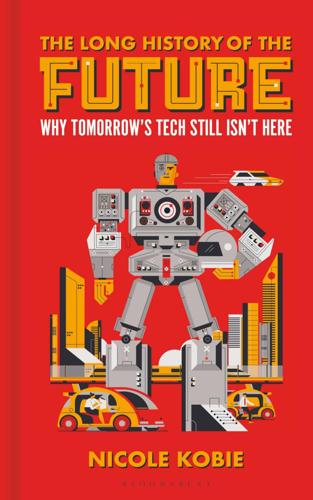
The Long History of the Future: Why Tomorrow's Technology Still Isn't Here
by
Nicole Kobie
Published 3 Jul 2024
It’s easy to see this working first where there’s money involved, linking a corporate headquarters with a rural outpost, a posh suburb with an office-filled city, or airports with each other or business districts.12 The Lilium Jet is geared towards something similar to this approach, starting out life as an electric business jet, or put differently, a flying corporate minibus. Lilium already has a partnership with private jet supplier NetJets for regional flights, so the early eVTOL customers may well be rich dudes getting from Miami airport to their favourite golf course. Wiegand is relaxed about that. ‘In the first two years, we will serve that premium helicopter and business jet market,’ he says. ‘And the reason is it’s got the highest margins – there’s a high willingness to pay to be the first and that helps us offset the higher cost initially when production volume is small
…
WIRED, September 6, 2019. https://biturl.top/nueuQ3 Index 1X Technologies - EVE and NEO here 510 Systems here A* algorithm here Abovitz, Rony here Ackland, Nigel here activism here, here ADALINE and MADALINE neural networks here Advanced Micro Devices (AMD) here Advanced Research Projects Agency Network (ARPANET) here, here Al Jaber, Sultan here Aldebaran Robotics here Alderson, Samuel W. here Alef Aeronautics here Allende, Salvador here Alphabet here, here, here Sidewalk Labs here, here see also Google Alphago algorithm, DeepMind here Altman, Sam here Amazon here, here, here American Institute Fair (1867) here American Research and Development Corporation (ARDC) here American Society of Automotive Engineers (SAE) here Anderson, Sterling here Anthony’s Robots here Antonov, Michael here Apple here, here, here, here, here, here, here, here, here augmented reality headsets here, here APT-E (Advanced Passenger Train) project, British Rail here Arcadio (aka Stelarc), Stelios here Argo AI here ARPA see DARPA (Defense Advanced Research Projects Agency) ARPANET (Advanced Research Projects Agency Network) here, here artificial intelligence (AI) here, here, here, here, here, here, here Alan Turing here Alphabet/Google here, here, here, here, here, here, here, here ‘Blocks World’ here chess challenges here, here, here, here computer vision here concerns and misuse here, here, here, here, here, here, here, here data resources and ImageNet here deep and machine learning here, here, here, here, here ‘expert systems’ and rules based models here, here, here ‘general’ intelligence here, here, here, here, here graphics processing units (GPUs) here John McCarthy here, here, here, here, here, here, here large language models (LLM) here Lighthill report (1973) and opposition here, here narrow AI here, here, here natural language processing (NLP) here, here neural networks here, here, here, here convolutional here OpenAI and ChatGPT here, here, here, here, here, here, here Perceptron model here pre-1970s here, here SRI Shakey robot here, here strong vs weak here, here symbolic here, here Timnit Gebru et al AI paper controversy here, here Asimo robot, Honda here ASKA here Asseily, Alex here Atari here, here augmented reality (AR) and virtual reality (VR) here, here Apple here, here, here Atari here, here computer graphics quality here, here development costs here Eric Howlett and the LEEP system here, here Facebook and Meta here, here, here, here Google Glass smart spectacles here, here, here Ivan Sutherland VR headsets here, here Jaron Lanier here, here, here Jonathan Waldern here metaverse the here Microsoft HoloLens here motion sickness here, here, here, here, here, here, here NASA here, here, here, here Nintendo and Virtual Boy here Palmer Luckey and Oculus Rift headsets here, here, here, here PTSD treatment here Rony Abovitz and Magic Leap here Samsung Gear VR here, here Sebastian Thrun here Sega VR here, here Snap and Vergence Labs here Sony PlayStation VR here Virtual Visual Environment Display (VIVED) here VPL DataGlove and EyePhone here, here, here, here Aurora here, here Aviauto roadable aircraft here Babbage, Charles here Bagnell, Drew here Baidu here Bakken, Earl here, here Balsillie, Jim here Banavar, Guru here banking industry here, here Barcelona, Spain here Bard LLM, Google here, here BASIC (Beginners’ All-purpose Symbolic Instruction Code) here battery technology here, here, here Beach, Alfred here, here Becker, Allen here Behringer, Reinhold here, here, here, here, here, here, here Bel Geddes, Norman here, here, here, here Bell Helicopter here Labs here, here Nexus here, here Bender, Emily here Bengio, Yoshua here Benz, Carl here Berlichingen, Götz von here Berners-Lee, Tim here Bertin, Jean here Bezos, Jeff here bionic technology here Blackrock Neurotech here ‘Blocks World’ AI development here Blomfield, Tom here ‘Blue Cruise’ automation system, Ford here Boeing here, here, here Bombe and Colossus decrypting machines here, here Boring Company here, here Boston Dynamics here, here, here, here, here, here, here, here Atlas robot here, here, here BigDog robot here, here RHex here Sandflea here Spot here, here, here, here Stretch here, here Bostrom, Nick here BrainGate/Utah Array implants here, here Branson, Richard here Bria, Francesca here Brin, Sergey here British army 2222 British Medical Journal here British Rail here, here Brooks, Harry here Brooks, Rodney here Brunel, Isambard Kingdom here Bryan, Leland here Buchanan, Bruce here Buolamwini, Joy here, here, here Burdett, Ricky here Canella, Judge John here carbon emissions here, here, here, here Cardboard, Google here Carmack, John here Carnegie Mellon University (CMU) here, here, here, here, here, here Carson, Johnny here Catalyst Research Corporation here Catanzaro, Bryan here CAVForth project, Forth Bridge here Cavoukian, Ann here CeBIT (2010) trade show here Central Intelligence Agency (CIA) here Cereproc here Chambless, Edgar here Chan Wolf, Helen here, here ChatGPT here, here, here, here Cisco here, here Claydon, Tony here Clegg, Samuel here, here climate crisis here, here Clinton Foundation here Clynes, Manfred here cochlear implants here Commodore here Convair (Consolidated Vultee Aircraft) here, here convolutional neural networks here Cook, Tim here Cornelius, Nancy here COVID-19 global pandemic here, here, here, here Cray 1 supercomputer here Crevier, Daniel here, here, here Crow, Steven here Croydon Times here Cruise, GM here, here, here, here, here Cubitt, Sir William here Cummings, Bob here Curtiss, Glenn here Cyberjaya, Malaysia here cybernetics here cyborgs and brain computer interfaces (BCIs) here BCIs here Blackrock Neurotech here Elon Musk and Neuralink here, here, here, here, here g.tec intendiX interface here, here Kevin Warwick here Mark Zuckerberg and Facebook here, here, here, here medical applications here, here, here, here, here, here, here, here Neil Harbisson and colourblindness here origins of the term ‘cyborg’ here pacemakers here Peter Scott-Morgan and ALS treatment here prosthetics and bionic technology here RFID chips here, here, here Utah Array/BrainGate implant here, here William House and cochlear implants here Cyc AGI here da Vinci, Leonardo here, here Daimler-Benz/Mercedes-Benz here, here Dally, Bill here DARPA (Defense Advanced Research Projects Agency) here, here, here, here, here, here, here, here, here, here, here, here, here Grand Challenge here, here DataGloves, VPL Research here, here Davis, Ruth here Dean, Jeffrey here DEC here Deep Blue AI here, here DeepMind, Google here, here, here DeGray, Dennis here Dendral algorithm here Desforges, Abbé here Devol, George here Dickmanns, Ernst here, here, here, here, here Dietrich, Carl here Difference Engine here Digital Equipment Corporation (DEC) here Dirks, Susanne here diversity, lack of tech industry here Djourno, Dr André here DNNresearch here, here Doctoroff, Dan here, here, here Dolgov, Dmitri here Dreyfuss, Henry here driverless cars/technology here, here, here, here 4D system here Anthony Levandowski here, here, here Anthony’s Robots pizza delivery here Argo AI here artificial intelligence (AI) here, here, here autonomy spectrum here, here current motivation for innovation here DARPA and DARPA Grand Challenge here, here Ernst Dickmanns and VaMoRs here, here, here fatalities here, here, here, here General Motors and Cruise (RCA) here, here, here, here global cost of development here Google/Alphabet and Waymo here, here, here, here, here, here, here, here, here, here motorways here, here, here, here, here NavLab 5 System and RALPH here ‘no hands across America’ trip here Norman Bel Geddes here Prometheus project here public transport here, here, here, here Road Research Laboratory (RRL), UK here Tesla here, here, here, here TRL GATEway pods here Tsukuba Mechanical Engineering Lab here Uber here, here, here US Congress here VaMP and VITA-2 here World’s Fair, New York (1939) here Dugan, Regina here Electronic Age magazine here Electronic Numerical Integrator and Computer (ENIAC) here, here Eliot, George here ELIZA here Elmqvist, Rune here Em, David here EMIEW, Hitachi here Engelberger, Joe here, here Engineer magazine here Enigma cypher here Entscheidungsproblem here ERCO Ercoupe here Ermisse, Daniel here Evans, Dave here Exhibition of the Society of Model Engineers (1928) here Eyriès, Dr Charles here Facebook here, here, here, here, here see also Meta Fairchild Semiconductor here, here Federal Aviation Administration (FAA), US here, here, here, here, here Fei-Fei Li here, here Feigenbaum, Edward here Fenton, Robert here, here Ferrer, Josep-Ramon here Fifth Generation Computer Project, Japan here Firefly driverless car here, here, here Fisher, Scott here, here Flood, Joe here Flow, Sidewalk Labs here flying cars here, here, here, here air-traffic control here Alef Aeronautics Model A here battery technology here business model operation here Carl Dietrich – Terrafugia Transition here EHang 184 (AAV) here Glenn Curtiss – Autoplane (1917) here Hafner Rotabuggy here Henry Ford – Flivver here, here Henry Smolinski Cessna/Ford here Jaunt Air Mobility Journey here Juan de la Cierva – autogyro (1923) here Ken Wernicke – AirCar here landing space and vertiports here Lilium Jets here, here, here, here, here, here, here Luigi Pellarini – Aeronova here Moulton Taylor – Aerocar here, here Opener BlackFly (later Pivotal Helix) here Paul Moller inventions here post-WWII small aircraft sales here potential practical applications here regulatory authorities here, here, here, here, here René Tampier – Avion-automobile (1921) here ‘roadable aircraft’ here, here Robert Edison Fulton – Airphibian here Sebastian Thrun – Kitty Hawk here Steven Crow – Starcar 4 here Theodore Hall and the ConvAirCar here, here Trajan Vuia – aeroplane-automobile (1902) here Vladimir Tatrinov – Aeromobile (1909) here Volocity – Volocopter here VTOLs and eVTOLs here, here, here Waldo Waterman inventions here Forbes Nash Jr, John here Ford, Henry here, here, here Ford Motor Company here, here, here Forest City, Malaysia here Forrester, Jay here Fortnite here Fortran here Foster + Partners here, here, here Foster, Quintin here, here Fox Dunn, Angela here Fujitsu here Fulton, Robert Edison here ‘Futurama’ exhibition, World’s Fair (1939) here Gaffney, Christopher here gaming industry here, here, here, here, here, here see also augmented reality (AR) and virtual reality (VR) Garrett AiResearch here Gasson, Mark here Gates, Bill here Gebru, Timnit here, here, here General Motors (GM) here, here, here, here, here, here, here General Problem Solver here generative adversarial network (GAN) here Gerhardt, Marcus here Glass smart spectacles, Google here, here Goddard, Robert here Goodfellow, Ian here Google here, here, here artificial intelligence (AI) here, here, here, here, here, here, here augmented reality and Glass smart spectacles here, here, here driverless cars here, here, here, here, here, here, here, here robots/robotics here, here, here X Labs here, here Gow, David here Graphics Processing Units (GPUs) here, here, here Greatbatch, Wilson here Greenfield, Adam here Gregory, Richard here Grumman TACRV (Tracked Air Cushion Research Vehicle) here g.tec here, here the Guardian here, here Guger, Dr Christoph here Günel, Gökçe here, here Hall, Dave and Bruce here, here, here Hall, Theodore here, here Harbisson, Neil here Hart, Peter here, here, here, here, here Harvard University here, here Hashme, Shariq here Hassabis, Demis here Hebb, Donald here Heilig, Morton here Heim, Michael here Henn na Hotel, Japan here Herzberg, Elaine here, here Heseltine, Michael here Hilbert, David here Hinton, Geoffrey here, here, here, here Hitachi here Hoff, Marcian here Hommet, Christophe here, 2241 Honda here, here, here Hopps, John here House, William here Howlett, Eric here HTC Vive VR headset here Hyman, Albert here hyperloops here, here, here 20th century pneumatic trains here Beach Pneumatic Transit Company here cable systems here Dalkey Atmospheric Railway (DAR) here Elon Musk here, here, here, here Eric Laithwaite and Tracked Hovercraft here, here European Hyperloop Week (EHW) (2023) here, here George Medhurst and Victorian pneumatic transport here, here, here, here Hyperloop TT here Isambard Kingdom Brunel here Jean Bertin and Aérotrain here John Vallance’s air-propelled carriage, Brighton (1826) here maglev technology here pneumatic postal shuttles here, here Rammel and Latimer Clark here, here Rohr Industries here, here Samuda brothers and Samuel Clegg here Shinkansen here, here, here Tracked Air Cushion Vehicles (TACV) programme here TransPod here Victorian atmospheric and pneumatic transport here, here, here Virgin Hyperloop One here IBM here, here, here, here ImageNet here Industry on Parade TV programme here the Information website here Ingels, Bjarke here Intel here, here International Conference on Robotics and Automation (2023), IEEE here, here internet here Iribe, Brendan here iRobot here Ishiguro, Hiroshi here, here Jaguar i-Pace here Joby Aviation here, here Kalinske, Tom here Kasparov, Garry here Kates, Josef here Kawasaki Heavy Industries here Kay, Alan here, here Keeling, Mary here Kese, Peter here Kim, John here Kitano, Hiroaki here Kitty Hawk here Kline, Nathan here Kobrinski, Alexander here Koppen, Otto here Krizhevsky, Alex here Krueger, Myron here Kuala Lumpur, Malaysia here Kuiken, Dr Todd here La Cierva, Juan here Laithwaite, Eric here, here languages, early computer here Lanier, Jaron here, here Larsson, Arne here Latimer Clark, Josiah here, here Laurel, Brenda here Laverde, Alberto Vejarano here Le Corbusier here LeCun, Yann here Leg Lab here Legg, Shane here Lenat, Doug here Levandowski, Anthony here, here, here, here, here, here Lidwill, Mark here Life magazine here, here Lighthill, James here, here Lilium here, here, here, here, here, here, here Linden Lab here the Line, Saudi Arabia here linear cities here linear induction motor (LIM) here, here, here Linear Induction Motor Research Vehicle (LIMRV) here Link, Sidewalk Labs here lithium batteries here, here Llama, Facebook here Lobban, Joan here Lockheed Missiles here London Pneumatic Despatch Railway (LPDR) here longtermism here Los Angeles Community Analysis Bureau (CAB) here Lovelace, Ada here LS3, Boston Dynamics’ here Luckey, Palmer here, here, here, here Lyft here Lyons here M-PESA here MacWilliam, John Alexander here Macy’s here Magic Leap here maglev technology here Mahan, Steve here Maisonnier, Bruno here Malapert, Etienne here Manchester Mark here Markoff, John here Marsh, Burton here Masdar City, UAE here Maslow, Abraham here Mattel here Mattern, Shannon here, here Mauchly, John here McCarthy, John here, here, here, here, here, here, here McClelland, James L. here McCulloch, Warren here, here McGreevy, Michael here McMillan-Major, Angelina here McShane, Clay here Mechanical Turk, Amazon here Mechanics Magazine here Medhurst, George here, here Medtronic here, here Meta here, here metaverse here Michie, Donald here, here Microsoft here artificial intelligence (AI) here, here, here HoloLens here Windows here military, US here, here, here, here, here, here, here, here, here, here, here, here, here, here, here, here, here, here Minadoi, Giovanni Tommaso here Minsky, Marvin here, here, here, here, here, here MIT (Massachusetts Institute of Technology) here, here, here, here, here Mitchell, Claudia here Mitchell, Margaret here, here Mitchell, Nate here Mitsubishi here Moller, Paul here Montandon, Adam here Montemerlo, Mike here Monzo here Moore and Moore’s Law, Gordon here Morgan, Garret here Musk, Elon here, here, here, here, here, here, here, here, here, here, here, here, here, here, here Mustang Mach-E, Ford here MYCIN here, here Nagle, Matt here Naimark, Michael here, here NASA (National Aeronautics and Space Administration) here, here, here, here, here National Transport Safety Board (NTSB), US here Nature here NerveGear headset here NetJets here neural networks here, here, here, here convolutional here Neuralink here, here, here New Scientist here New York City fires, 1970s here New York Times here, here, here, here, here, here, here, here, here Newell, Allen here, here Ng, Andrew here Nilsson, Nils here Nintendo here Virtual Boy here Normann, Richard here, here Nvidia here Ocado Technologies here Oculus Rift AR smart glasses here Oculus Rift VR headsets here, here O’Hagan, John here, here O’Kane, Josh here, here Okhitovich, Mikhail here Olson, Karl here, here Open Bionics here OpenAI here, here, here, here, here, here Opener BlackFly/Pivotal Helix here Optimize3D here Optimus robot, Tesla here Osborne 1 here Otto here Ottobock here pacemakers here Paes, Eduardo here Page, Larry here, here, here, here, here, here Papert, Seymour here Paré, Ambroise here PDP-8 and PDP-10 ‘microcomputers’ here Pellarini, Luigi here Penoyre, Slade here perceptrons, AI here Permobil F5 Corpus here Petman, Boston Dynamics’ here Pichai, Sundar here, here Pinkus, Henry here Pitcairn, Harold here Pittau, Rev.
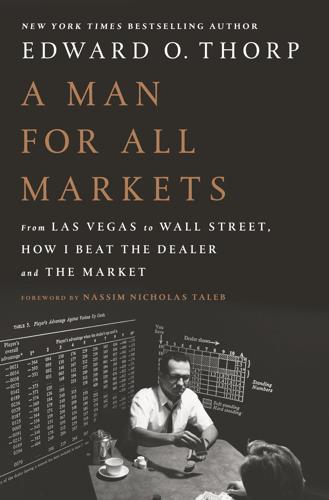
A Man for All Markets
by
Edward O. Thorp
Published 15 Nov 2016
The 2003 annual report lists some sixty-six of these, with 172,000 employees, orchestrated by Warren and Charlie from a corporate office that has “swollen” to sixteen employees. Third and perhaps most important is the insurance segment consisting mostly of GEICO and the reinsurance company General Re. We headed for lunch and the NetJets exhibit at the local airport. Saturday night we were back at Gorat’s. The price of the T-bone dinner we had Friday was, as a “special for shareholders,” now $3 more. Charlie Munger reluctantly worked the room we were in and I mentioned to him a tale I’d heard about his youth. Charlie had gone to Harvard Law School and, when my friend Paul Marx got his degree there a few years later, he found that Charlie was a legend—with many saying he was the smartest person ever to have attended.
…
The securities markets price these every day. Is this Buffett portfolio worth more than, less than, or the same as its market price? Should one add a premium for Buffett’s market timing and stock-picking prowess? Second are numerous wholly owned companies such as See’s Candies, Clayton Homes, and NetJets. We can value these by applying the principles of security analysis to the balance sheets, and by considering the growth rates of the companies, their “franchise value,” and the quality of management. The third component is the insurance group, with GEICO the most important. To value these non-public companies we use, in addition to security analysis as above, the value of the “float.”
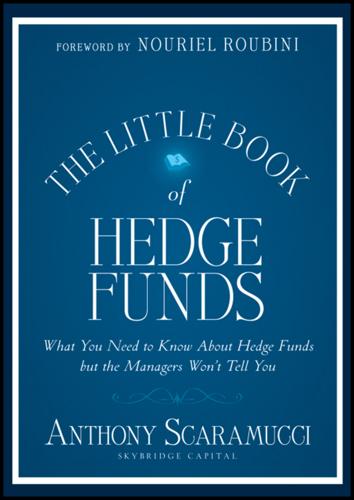
The Little Book of Hedge Funds
by
Anthony Scaramucci
Published 30 Apr 2012
Based upon that answer, they must then ascertain which money manager possesses the best-equipped toolbox and skill set to help them achieve these objectives and make money. By the way, my friends, back in 1956 Mr. Buffett himself had a hedge fund and operated more than 12 hedge fund partnerships until 1970. Furthermore, is it any more grotesque a fee arrangement than to fly on NetJets, a Berkshire Hathaway subsidiary? Please pass the carrots with the hypocrisy; I need my night vision. As the expression goes, “Let he who is without sin, cast the first stone.” And let hedge fund managers who are incentivized to perform, make the next big trade. In the Words of a Hedge Fund Legend . . .
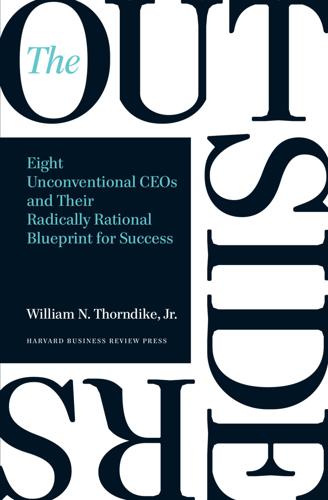
The Outsiders: Eight Unconventional CEOs and Their Radically Rational Blueprint for Success
by
William Thorndike
Published 14 Sep 2012
This package is highly differentiated from the private equity alternative, which promises a high level of investor involvement and a typical five-year holding period before the next exit event. Buffett never participates in auctions. As David Sokol, the (now former) CEO of MidAmerican Energy and NetJets, told me, “We simply don’t get swept away by the excitement of bidding.”9 Instead, remarkably, Buffett has created a system in which the owners of leading private companies call him. He avoids negotiating valuation, asking interested sellers to contact him and name their price. He promises to give an answer “usually in five minutes or less.”10 This requirement forces potential sellers to move quickly to their lowest acceptable price and ensures that his time is used efficiently.
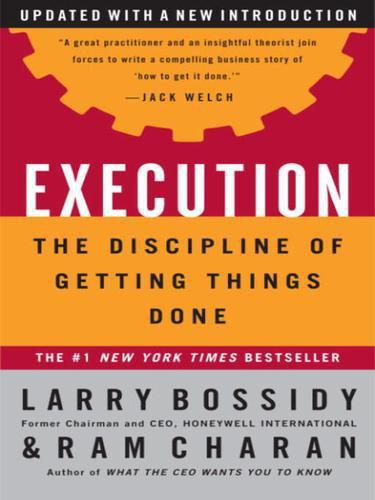
Execution: The Discipline of Getting Things Done
by
Larry Bossidy
Published 10 Nov 2009
A new market segment in the aircraft industry has recently changed the dynamics for manufacturers and suppliers. In the past seven or eight years, as commercial airline service and schedules deteriorated and prices rose, the corporate jet business has taken off. In 1996 Executive Jets pioneered fractional ownership, which is time-sharing in the sky, with its NetJet program. The new segment it created rapidly became the fastest-growing one in the business. Among manufacturers the big winner was Bombardier of Canada, because Bombardier built planes that were right for the market—larger than the ones made by rivals such as Beech Aviation and Cessna and smaller than those of Boeing or McDonnell Douglas, and foreign competitors.
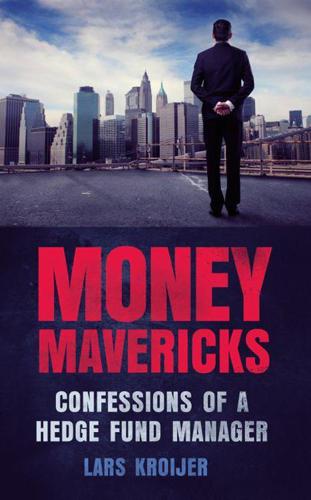
Money Mavericks: Confessions of a Hedge Fund Manager
by
Lars Kroijer
Published 26 Jul 2010
Our girls joined the ranks of pretty blonde princesses being led to their £12,000-a-year private nursery by someone who was obviously not Mummy. For the first time in my life, I even started to buy business-class airline tickets. It seemed almost natural at the time and we could easily justify the expense. I even took a call from Netjets (the private jet-share company) and thought about it for ten seconds before deciding that it was a serious waste of money. In Denmark in the late 1970s and early 1980s you were considered wealthy if your family had two cars – which we did. But we were not rich. Not rich like I got to see and experience in London in the early part of the new millennium.
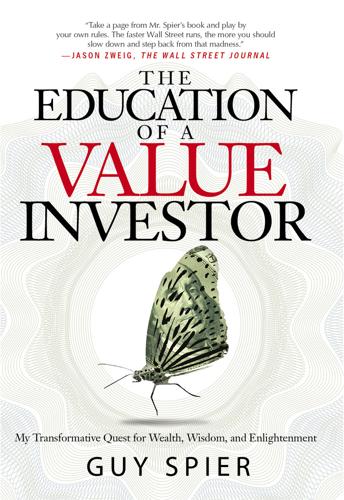
The Education of a Value Investor: My Transformative Quest for Wealth, Wisdom, and Enlightenment
by
Guy Spier
Published 8 Sep 2014
Sometimes I would look back at a situation where I had missed some vital clue, shake my head, and say, “How did I not see that?” Mohnish added his own mistakes to the mix. We combined these with some (infrequent) errors that we had seen Buffett and Munger make, including their investments in NetJets, Dexter Shoe Company, and Diversified Retailing—a reminder that retail is a tougher place to make money than most people realize. Buffett, with characteristic candor, confessed in his 2007 letter to shareholders: “To date, Dexter is the worst deal I’ve made. But I’ll make more mistakes in the future—you can bet on that.
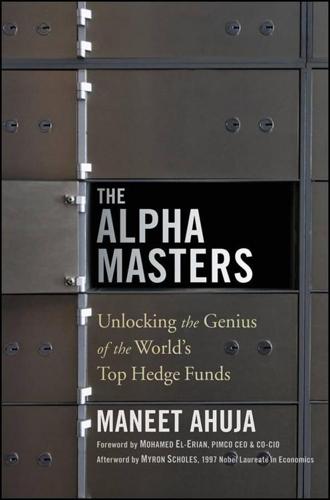
The Alpha Masters: Unlocking the Genius of the World's Top Hedge Funds
by
Maneet Ahuja
,
Myron Scholes
and
Mohamed El-Erian
Published 29 May 2012
Many leading investors, like Weinstein, are recognized experts in chess, and say an affinity for the game is favored in hiring as games of strategy mirror the strategy of financial decision-making. Photo credit: (c) Hiroko Masuike/The New York Times/Redux Boaz Weinstein (center) alongside Warren Buffett (far left) at the NetJets First Annual Poker Championship in June 2005. Photo credit: Boaz Weinstein
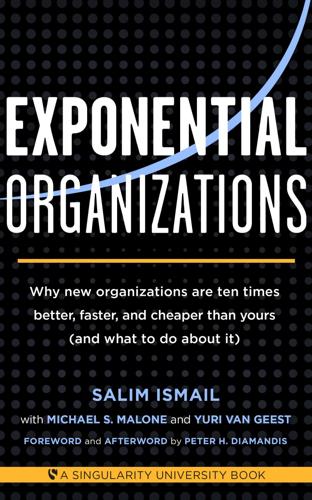
Exponential Organizations: Why New Organizations Are Ten Times Better, Faster, and Cheaper Than Yours (And What to Do About It)
by
Salim Ismail
and
Yuri van Geest
Published 17 Oct 2014
Apple & Foxconn) ( ) We emphasize agility - even mission critical functions are outsourced as variable costs rather than fixed costs 3) To what extent do you own vs. rent the assets in your organization?* ( ) We own all assets except peripheral equipment (e.g. copiers) ( ) We access some key equipment/services on demand (e.g. cloud computing) ( ) We use on-demand assets in multiple business functions (e.g. Hackerspaces or shared offices vs. leasing or buying office space; Using Netjet vs. buying a jet) ( ) We use on-demand assets even in mission critical areas (e.g. Apple & Foxconn) Community & Crowd 4) To what extent do you manage and interact with your Community (users, customers, partners, fans)?* ( ) We have very passive involvement with our community (i.e. we use some social media) ( ) We leverage our community for market research and other listening activities ( ) We actively use the community for outreach, support and marketing ( ) The community heavily influences our organization (e.g. product ideas, product development) 5) How do you engage your Community?
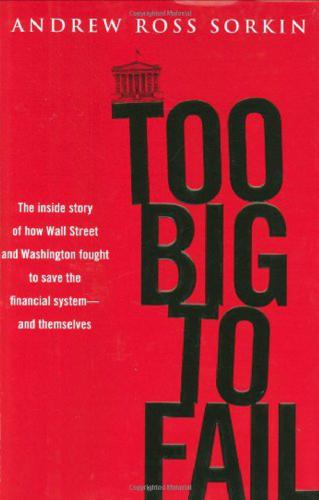
Too big to fail: the inside story of how Wall Street and Washington fought to save the financial system from crisis--and themselves
by
Andrew Ross Sorkin
Published 15 Oct 2009
“It’s like the Long Island energy utility trying to buy something in Russia,” he told Barancik. But they promised to do the best they could. Skip McGee, a forty-eight-year-old Texan, commuted to New York every week from Houston to run Lehman’s investment banking operations. He’d board a private plane using the firm’s NetJets account every Sunday evening around 7:30, land in New York around midnight, and take a car to his rental on the Upper West Side. Come Thursday night he’d be on a first-class flight back to Houston on Continental. McGee, a classic, old-school, back-slapping banker, was clearly ambitious. After graduating summa cum laude from Princeton and getting a law degree, he had spent nearly two decades at Lehman, first as a banker for wildcatters in the oil patch of his backyard and then moving up the ranks until he became the head of the entire investment banking division and joined Fuld’s vaunted executive committee.
…
Geithner’s office wouldn’t start calling all the CEOs until just past 4:00 p.m., after the market had closed. The last thing they could afford was for news of the meeting to leak. Paulson, who usually made the trip to New York on US Airways, which offered a government discount—Wendy had always given him grief about flying in a private jet—arranged to charter a plane to New York, using his NetJets account. He couldn’t afford to be delayed; the matter at hand was too important, and the weather was atrocious. If anything, he was worried the plane wouldn’t even be able to take off. As they sped toward Dulles to catch the flight, Paulson, almost inaudibly, said, “God help us.” CHAPTER FOURTEEN Lloyd Blankfein was milling about the greenroom at the Hilton Hotel on Fifty-third Street at Sixth Avenue, waiting to make a speech at the Service Nation Summit, an annual conference coordinated by a coalition of nonprofits that promotes volunteerism in America.
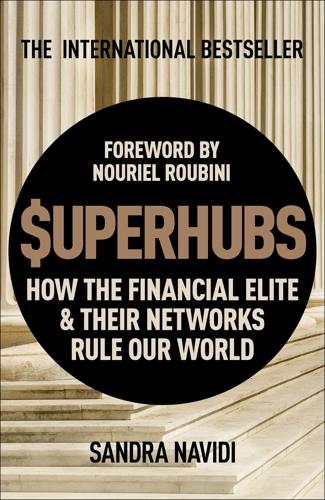
SUPERHUBS: How the Financial Elite and Their Networks Rule Our World
by
Sandra Navidi
Published 24 Jan 2017
Throughout his tenure, however, Ackermann remained controversial. Ackermann had always been a power broker who successfully placed himself in the center of relevant networks and crucial events. Wherever the financial elite congregated, he was sure to be in their midst. He spent so much time in the air that he became one of NetJets’ top ten fliers in Europe. Due to his superhub position at the core of financial, economic and political networks, he achieved his greatest power at the pinnacle of the financial crisis. As Chancellor Merkel’s confidante and finance minister Peer Steinbrück’s adviser, his status morphed from that of mere banker to quasi-statesman.
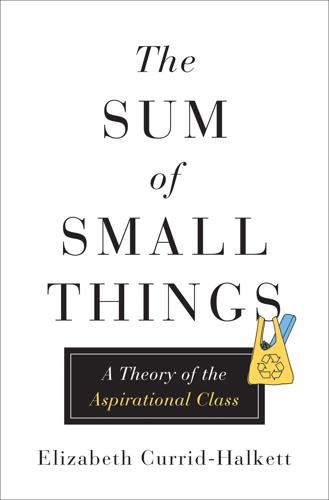
The Sum of Small Things: A Theory of the Aspirational Class
by
Elizabeth Currid-Halkett
Published 14 May 2017
As the economist Robert Frank observes, with the outcry over inequality in full swing, public hedonism and overt luxury spending have become flashpoints in the debate (which is not to say they aren’t spending money), and thus those in top income groups find new channels for their money that are known only to those in their circles (whether it’s a live-in housekeeper or, for the very rich, NetJets to Art Basel Miami).26 Conversely, the middle class, those in the 40th to 60th percentile income bracket making on average $47,000 a year, are returning to their pre-Recession conspicuous consumption behavior while reducing their spending on inconspicuous consumption in the post-Recession period.
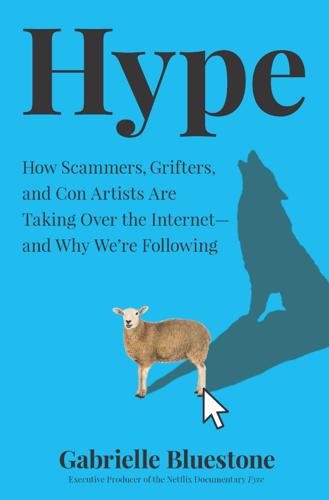
Hype: How Scammers, Grifters, and Con Artists Are Taking Over the Internet―and Why We're Following
by
Gabrielle Bluestone
Published 5 Apr 2021
“I think about this all the time. The JetSmarter guys, that business model has demonstrably been proven not to work, and yet somehow, the story line for the past four years is how they got to a billion-dollar valuation, and Jay-Z invested, and this and that,” Wells said. “No one’s like, ‘Hey, look, NetJets was purchased by Berkshire, and it’s publicly available with what you can do with that.’ It doesn’t work. Why is the coverage glowing and positive versus, like, ‘Hey, this thing’s hemorrhaging cash and there’s no way it works?’” That’s a question Ja Rule (real name Jeffrey Atkins) has for all the people who now think he should have been able to see past the hype around McFarland.
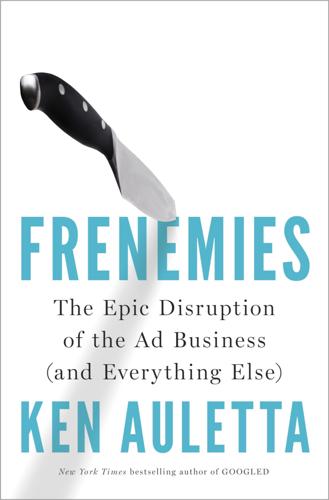
Frenemies: The Epic Disruption of the Ad Business
by
Ken Auletta
Published 4 Jun 2018
Or sometimes he wants us to sponsor one of his events, and he’ll call me up and tell me, ‘John [Wren, CEO of Omnicom] and Martin [Sorrell] are going to do it. Are you going to?’ Then he calls John and Martin and says ‘Roth is going to do it.’ Then we’ll all meet at the event and say, ‘Why the fuck are we doing this?’” One gets a sense of Michael Kassan, connector, watching him confer with his chief of stuff, Martin Rothman, on the leased six-seat NetJet as it leaves Miami after a 4A’s conference in April 2016. They review a draft presentation he had dictated and the staff honed, which he’s to present to a client the next day, suggesting how the client should market itself and what new media efforts it should undertake. “One of the questions the client asked,” Kassan says, “is how do we benchmark against what our competitors are doing?”
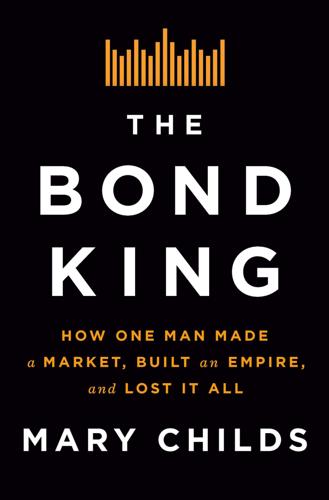
The Bond King: How One Man Made a Market, Built an Empire, and Lost It All
by
Mary Childs
Published 15 Mar 2022
” * Through his lawyer, El-Erian says references to his compensation are inaccurate but offered no correction. The figures have been previously published elsewhere. * Despite “access to private planes and expensive cars,” El-Erian’s lawyer says, “Dr. El-Erian did not use these modes of transportation. Indeed, while CEO and co-CIO at Pimco, he repeatedly refused to use the Netjets budget that was available to him and traveled via commercial airlines.” * “It was Allianz that asked Dr. El-Erian to stay on within the Group as chief economic advisor,” El-Erian’s lawyer says. “It was not Dr. El-Erian’s idea. At no point did Dr. El-Erian suggest or request this, and it’s a position that he still holds today, seven years after leaving Pimco
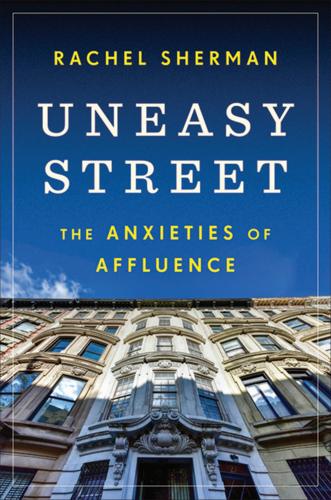
Uneasy Street: The Anxieties of Affluence
by
Rachel Sherman
Published 21 Aug 2017
Having lived in New York for years, I knew the differences among neighborhoods in Manhattan and Brooklyn and something about jobs in finance (and much more, of course, about those in academia and nonprofits). Surely there were more issues that I might have tripped over if I had not been from the same background, but these were invisible to me. Some of this implicit knowledge became explicit when my research assistant was unfamiliar with certain luxury goods and services, such as NetJets, the private airplane rental service. Transcribers likewise lacked certain referents of elite consumption and education, such as—to take four examples that came up in a single interview—Chippendale furniture, RISD (the Rhode Island School of Design), Hermès, and Groton (an elite boarding school).
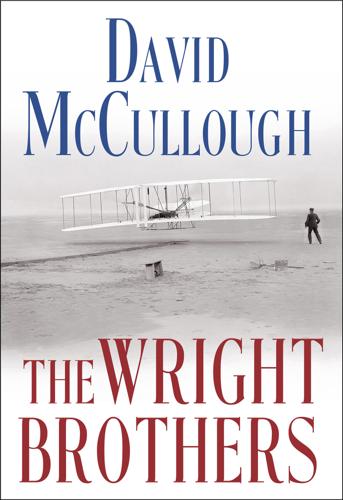
The Wright Brothers
by
David McCullough
Published 4 May 2015
At Le Mans, Marc Denoueix, an authority on the importance of Wilbur Wright’s performances there, and at Pau, Paul Mirat, no less an expert on that part of the story, provided tours as fine as one could wish for. I appreciated also the chance to talk with a senior member of the famous Bollée family of Le Mans, Gerard Bollée, and to have been treated to a tour of the noted Automobile Museum at Le Mans by François Piquera. And again, thanks, too, to Captain Nicole Sammels of NetJets. I’m grateful also to the Medina County Library and the Medina County Historical Society in Ohio, and the Camden Public Library and the Owls Head Transportation Museum in Maine, Judy Schiff of the Sterling Library at Yale, and Melissa Cronyn and Miles Barger of the U.S. National Park Service. I salute my old friend and literary agent, Mort Janklow, and sing his praises still again for providing sound advice and the kind of enthusiasm that keeps the batteries charged.
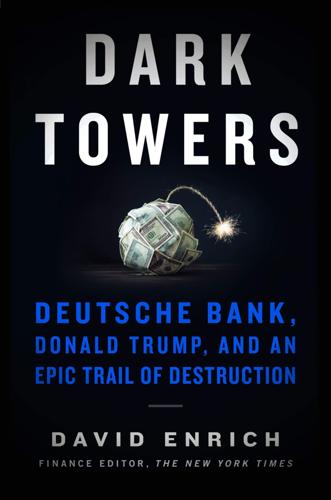
Dark Towers: Deutsche Bank, Donald Trump, and an Epic Trail of Destruction
by
David Enrich
Published 18 Feb 2020
Police and a bomb squad rushed over, their sirens screaming. Inside the envelope was a small explosive device, sent by an Italian anarchist group. An accompanying letter attacked “banks, bankers, fleas, and bloodsuckers.” Like Abs and Herrhausen before him, Ackermann had assumed the mantle of statesman. He traveled the world on a private NetJets plane, dining with world leaders including Vladimir Putin and George W. Bush—not to mention a who’s who of European politicians and royals. With Europe now in its own financial crisis, and entire countries like Greece and Ireland falling apart, Ackermann had become a sort of shadow finance minister for the entire continent.
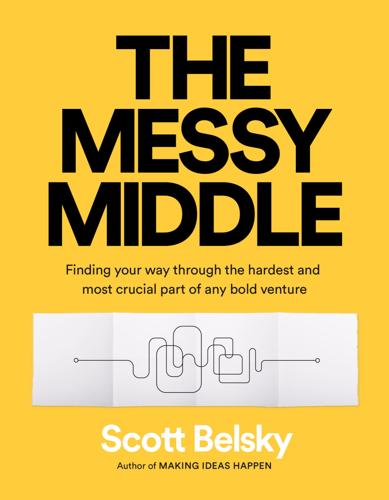
The Messy Middle: Finding Your Way Through the Hardest and Most Crucial Part of Any Bold Venture
by
Scott Belsky
Published 1 Oct 2018
And when I lay dying, I hope to look back on what I would consider a full life. NEVER BEING FINISHED Continuing to learn is an elixir to life. As I write, Warren Buffett is eighty-seven years old and still regarded as one of the greatest investors alive: His company, Berkshire Hathaway, holds more than $600 billion in assets and wholly owns companies like GEICO, NetJets, and Dairy Queen, and is among the largest owners of American Express, Apple, Coca-Cola, and Wells Fargo, among many other companies. His annual letters to investors in Berkshire Hathaway help us understand what keeps him at the forefront of his industry. After reading just a few of these letters, a couple of things stand out.
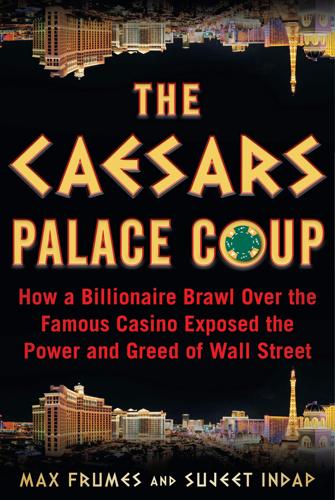
Palace Coup: The Billionaire Brawl Over the Bankrupt Caesars Gaming Empire
by
Sujeet Indap
and
Max Frumes
Published 16 Mar 2021
In 2007, Tepper’s fiftieth birthday was held at the Mandarin Oriental hotel across the street from Central Park and featured Sheryl Crow, with whom he sang on stage. In a 2010 profile in New York Magazine, Tepper famously asked the writer, Jessica Pressler, what to do with his billions. “‘What do you think I should do with it?’ he asked me. ‘I could buy an island. I could buy a private jet—but I have NetJets. I could get myself a twenty-two-year-old!’” Tepper, the richest man in New Jersey and wealthier than the three Apollo founders combined, had been married for years and had three children. His primary home was a relatively modest place in Livingston. But in 2010, he bought the Hamptons beachfront estate of one-time nemesis Jon Corzine for $44.5 million, then tore it down to build a new vacation house that would be completed in 2015 (the property belonged to Corzine’s ex-wife at the time).
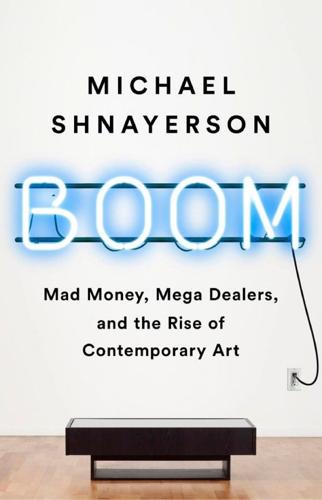
Boom: Mad Money, Mega Dealers, and the Rise of Contemporary Art
by
Michael Shnayerson
Published 20 May 2019
Space at the hotel was so tight that Gagosian’s entourage had to sleep elsewhere: only the king got a room at the Three Kings. Most other dealers would arrive on Monday, a day before the fair’s coveted VIP opening. A few, like silver-haired blue-chip dealer Bill Acquavella, would arrive in their own planes. Others would descend at Basel’s EuroAirport in NetJets filled with collectors and money, like an art world air force. Many dealers had sent images of works from their fair inventories to clients, and many of those works had been put on reserve. Some 35 years before, Gagosian had earned scorn in SoHo for showing photographs or transparencies of paintings that weren’t always his to sell.
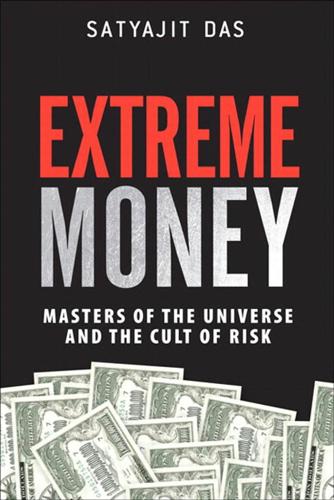
Extreme Money: Masters of the Universe and the Cult of Risk
by
Satyajit Das
Published 14 Oct 2011
Rising prices are a narcotic that affect the reasoning power up and down the line.16 He did not acknowledge any failure or complicity of the agencies in creating the bubble. When Goldman Sachs was indicted for alleged violations in structuring and selling CDOs, Buffett, a major investor in Goldman, defended the firm, its actions and its CEO. In 2011, David Sokol, the CEO of Netjets, a company in which Buffett had a significant shareholding, resigned. Sokol had been a candidate for succeeding Buffett at Berkshire Hathaway. Sokol’s resignation came after disclosure of his purchase of Lubrizol shares before Berkshire bought the chemicals company, netting him a $3 million personal profit.